Prussia, the New Kid
on the Block
|
At the conclusion of the Thirty Years War, a new player in
the European Theater appeared. Its name was Prussia.
Now how can a new power appear out of nowhere?
Prussia had been there all along, slowly building steam
over the centuries.
The Thirty Years War was the catalyst that opened the door
for this middle of the road power to emerge as a superpower.
This story begins with the Hohenzollerns, a dynastic
family very similar to the Habsburgs. It
is an interesting story because it is a classic example of
how Europe operated in the Middle Ages.
This German family deliberately went
about acquiring various small political units. Over
time, the family parlayed
them into a vast empire that would someday become the nation
of Germany.
The Hohenzollerns got their start in the
Burgraviate of Nuremberg, a state of the Holy Roman
Empire from the early 12th to the late 15th centuries.
Nuremberg flourished due to its central location.
It became one great trade centers on the route from Italy to
Northern Europe.
Count Frederick III of Zollern was a loyal retainer
of the Holy Roman Emperors Frederick Barbarossa and
Henry VI. In 1185 Count Frederick married
Sophia of Raabs, the daughter of Conrad II, Burgrave of
Nuremberg (Burgrave:
hereditary ruler of a German town).
When Conrad II died in 1192, he left no male heirs.
Frederick III, husband to Conrad's daughter, was
granted the burgraviate of Nuremberg. He became Burgrave Frederick I
of Nuremberg-Zollern. At this point the family name changed
to
Hohenzollern.
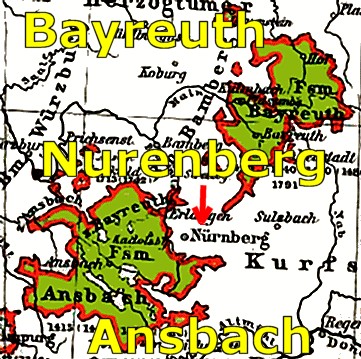 |
1192 in
Nuremberg will be our starting point for the
advance of the Hohenzollern dynasty.
After
Frederick's death, his two sons partitioned the
family lands between themselves.
|
•
The older brother,
Frederick IV, received the county of Zollern and burgraviate
of Nuremberg in 1200 from his father, thereby founding the
Swabian branch of the House of Hohenzollerns. The Swabian
line remained Catholic and would fade into mediocrity,
Meanwhile
his brother's Franconian line would flourish.
•
The younger brother,
Conrad III, received the burgraviate of Nuremberg from
his older brother Frederick IV in 1218, thereby founding the
Franconian branch of the House of Hohenzollern. The
Franconian line would later convert to Protestantism.
Emperor Frederick II wished to develop Nuremberg to a
dependable base. Therefore in 1219 he bestowed a great
charter of freedom upon the castle market. While Conrad took
over the military protection of the town as a Burgrave, the
citizens were able to attain an increasing autonomy in their
internal affairs.
During his reign, Conrad would acquire the Rangau with
Ansbach, significant parts of the Pegnitz valley and
gained control over the most important trade routes to
Nuremberg. He successfully fought against the
marauding knights and warded off the nobility.
•
Frederick III of
Nuremberg (1220-1297) was the next Hohenzollern Burgrave of
Nuremberg
In 1248 he received from the Counts of Andechs the region of
Bayreuth by a so-called Meran's inheritance.
In 1273 Frederick III gave his deciding vote for his friend Rudolf of
Habsburg on the election to the king of the Romans. As a
reward, the King confirmed his position as a Burgrave and
granted the rank of a Prince-Elector. At this time,
Wunsiedel, Erlangen and Arzberg came into the possession of
the House of Hohenzollern.
This was important. Frederick III had just become one of
the Princes of Germany who were involved in electing the
King.
•
Frederick IV
(1287–1332) was notable for purchasing the town of Ansbach
(1331), nucleus of the later Hohenzollern Principality of
Ansbach established in 1398.
•
Frederick V
(1333–1338) acquired the principality of Bayreuth.
•
John II
(1309-1357) acquisition of the county of Kulmbach.
He purchased the contract of inheritance which became
effective with the extinction of the present owners.
•
Frederick VI
(1371–1440) became the first member of the House of
Hohenzollern to rule the Margraviate of Brandenburg,
one of the three most important duchies in the German area.
|
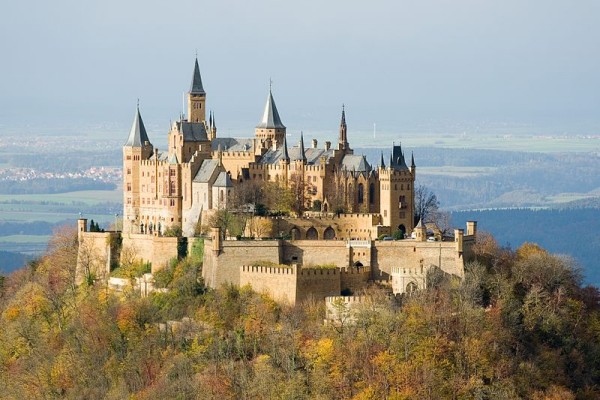
Hohenzollern Castle, ancestral home of the Hohenzollern
family
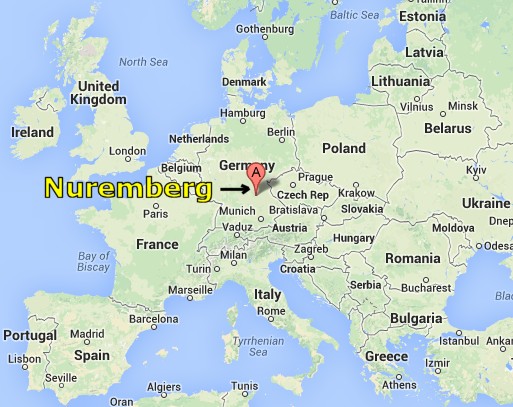
Nuremburg was a town when the Hohenzollerns got their start.
It would eventually become a major city in south central
Germany.
Today's
Rhine-Main-Danube canal runs through the center of town.
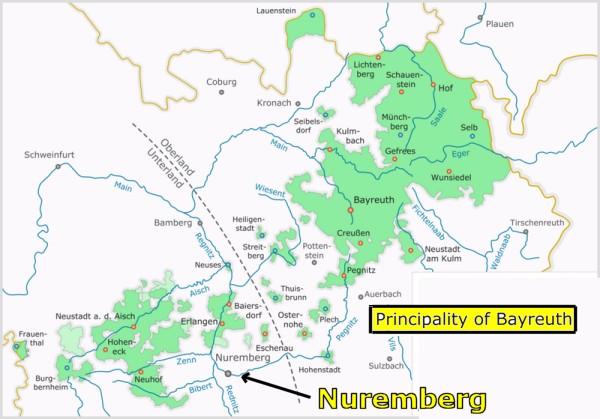
Nuremburg and Bayreuth. The Hohenzollerns are off to a good
start.
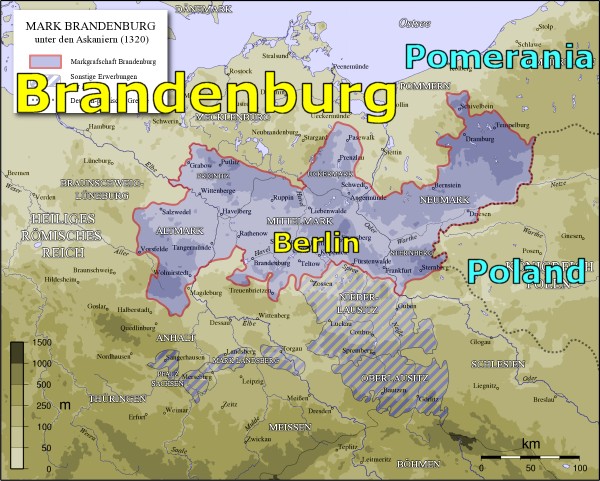
Brandenburg did not yet belong to the Hohenzollerns, but in
1411 they began governing this important territory.
|
So how did
Frederick VI get this promotion?
Keep in mind that the King of Germany was an elected
position. The Hohenzollern family was one of the seven
Prince Electorates who made the decision who would be the
next king.
Early in his
career,
Frederick VI made a important friend in Sigismund, King of
Hungary, when he fought in a major campaign.
|
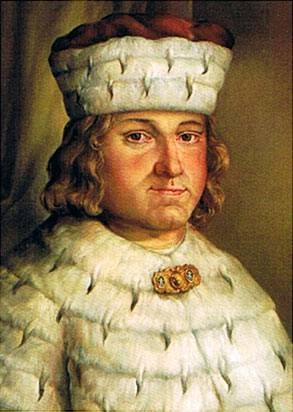
Frederick VI |
In 1410, the death of Rupert, King of the Germans,
left the throne of the Holy Roman Empire vacant.
Sigismund enlisted Frederick's help in obtaining the
throne.
At the time, Jobst of Moravia ruled Brandenburg.
Therefore Jobst was one of the 7 prince-electors who had the right to
vote for the new emperor. Jobst opposed Sigismund's
election to be king.
Jobst's death under suspicious circumstances in 1411 cleared
the way for Sigismund's recovery of Brandenburg. Sigismund
enjoyed an
undisputed election as king of the empire later that year.
In gratitude for Frederick's services, King Sigismund
immediately made
him governor of Brandenburg.
Frederick fought with an iron hand against the rebellious nobility of the
March of Brandenburg (in particular, the Quitzow family).
In the end, he restored security.
Frederick was
rewarded for taming this important territory.
In 1415, King Sigismund granted Frederick the titles of
Margrave and Prince-elector of Brandenburg. On 21 October
1415 the Brandenburg states meeting in a Landtag asked
Frederick to rule in Berlin. The king awarded him the formal
enfeoffment of the margravate on 18 April 1417.
(enfeoffment:
deed by which a person is given land in exchange for a
pledge of service).
Brandenburg was a giant acquisition for the
Hohenzollern family. Brandenburg was one of the
premier duchies in the Kingdom of Germany.
The Hohenzollerns had started small in Nuremburg back in
1192. Now with the acquisition of Brandenburg in 1417,
the Hohenzollern family had definitely reached the big
leagues.
|
|
|
|
|
Old
Prussia and the Teutonic Knights
|
The Teutonic Knights were a German medieval military order
that was involved in the Holy Land Crusades. It was
formed to aid Christians on their pilgrimages to the Holy
Land by establishing way stations and hospitals. The military membership was
always small, with volunteers and mercenaries augmenting the
force as needed.
The Third Crusade (1189–1192), also known as the Kings'
Crusade, was an attempt by European leaders to reconquer the
Holy Land from Saladin. The Third Crusade featured an
all-star lineup which included the German Emperor
Frederick Barbarossa, King Richard I the
Lionheart of England, and King Philip II of France as
well as the Teutonic Knights.
The campaign was largely successful, capturing Acre, Jaffa,
and reversing most of Saladin's conquests. However, it
failed to capture Jerusalem, which was the emotional and
spiritual fixation of the Crusade.
After the Crusade concluded, the Teutonic Knights needed
something to do. At the time, Konrad of Masovia
(Poland) was busy trying to conquer adjacent pagan lands in
Prussia, an area in the Eastern Baltic.
Unfortunately, Konrad wasn't doing very well.
At the invitation of Konrad and with the blessings of the
Holy Roman Emperor, the military order began a Northern
Crusade in 1230. Konrad and the Teutonic
Knights launched a joint invasion of Prussia intended to
Christianize the Baltic Old Prussians. The Teutonic Knights
were encouraged by the Emperor's whispered suggestion that
they could keep whatever
they conquered.
To make a long 50 year story short, the Teutonic Knights were
spectacularly successful. After conquering the area
known as Prussia (see map), they told Konrad of Masovia to
go take a hike, then settled down in their new territory.
Over the next 30 years (1230-1260), the Knights continued to
expand their territory to the north, conquering areas such
as Lithuania, Livonia (Latvia), and Estonia.
Then the Knights spent the next 20 years subduing the
populace and bending them to their will and ways.
Fighting between the Knights and the Prussians was
ferocious. The conquest of Prussia was accomplished
only with much bloodshed. It was spread out over more than
50 years during which native Prussians who remained unbaptised were subjugated, killed, or exiled.
After 50 years of warfare and brutal conquest, the end
result meant that most of the Prussian natives were either
killed or were deported. With the population
decimated, the Teutonic Order
encouraged the immigration of colonists from the Holy Roman
Empire of the German Nation (mostly Germans, Flemish, and
Dutch). The colonists included nobles, burghers, and
peasants. Any surviving "Old Prussians" were gradually
assimilated through a process called "Germanization".
Unfortunately the brutal Teutonic Knights were better at
fighting than creating civilization. They never made
any real attempts to use diplomacy to create peace in the
area.
Poland hated them, Russia hated them, Lithuania hated them,
and their own citizens hated them. A series of
counter-attacks began. After the high point of 1260, each
future war over the next two centuries cost them large
chunks of territory.
Keep in mind that these were military men. They were
better at killing than building. They ruled through
force, not through politics and compromise. As the
economic fortunes of their area declined, the Knights had
trouble paying their bills and hiring new mercenaries to do
their fighting.
The Prussian Confederation was an organization formed
in 1440 by a group of 53 nobles and clergy and 19 cities in
Prussia to oppose the heavy taxation and poor leadership of
the Teutonic Knights. The revolt of the Prussian
Confederation in 1454 enticed Poland to join the battle
on their side.
This began the Thirteen Years War (1454–1466).
The Teutonic Knights were the losers, the Poles were the
winners. Under the terms of the peace treaty, the
Poles received extensive territory.
Forty years later, Sigismund I (1467-1548) became King of Poland and Grand Duke of Lithuania in 1506. Sigismund would
play a key role in the fortunes of Europe by
strengthening the Habsburgs as well as the
Hohenzollerns during his reign. Any study of the
Prussian-Austrian rivalry in the 1800s has to include this
chapter.
Sigismund was having trouble enforcing the terms of 1466
peace treaty. The Teutonic Knights had been in a long power
struggle with Poland over Prussia and now they were
threatening another war to regain the lands lost in
1466. Sigismund knew the Teutonic Knights answered to
only one authority, the Holy Roman Emperor. So
Sigismund swung a deal with HRE Emperor Maximilian.
In return for Maximilian keeping the Teutonic Knights in
line, Sigismund consented to the marriage of the children of
Vladislaus II of Bohemia and Hungary, his brother, to the
grandchildren of Maximilian, a Habsburg. Through this
double marriage contract, Bohemia and Hungary would pass to
the House of Habsburg in 1526, on the death of Sigismund's
nephew, Louis II. This was a huge break for the
Habsburg dynasty.
Sure enough,
Sigismund regretted the deal from the moment he made it.
He was deeply worried about the growing ties between the
Habsburgs and Russia, Poland's worst natural enemy.
Meanwhile the Teutonic Knights' fortunes had steadily
declined throughout the 15th century. They in turn hoped
that by selecting a new leader connected by marriage to the
ruling dynasty of Poland, they would strengthen their
bargaining position and be able to get their lands back by
diplomacy rather than war.
In 1511 the Teutonic Knights turned to Albert
(1490-1568), a member of the Brandenburg-Ansbach branch of
the House of Hohenzollern to become their new Grand Master.
Albert's election as Grand Master worked wonders. He
was a skilled political administrator and leader.
Albert did
indeed reverse the decline of the Teutonic Order.
Albert of Hohenzollern had been chosen specifically in the
hope that his relationship to his maternal uncle, Sigismund, Grand Duke of Lithuania and King of Poland, would
facilitate a settlement of the disputes over eastern
Prussia.
Albert, the new Grand Master, was completely loyal to his
duties to the HRE and to the papacy. Albert defied his
uncle Sigismund and refused to
submit to the crown of Poland.
In 1519, Poland declared war. The Teutonic-Polish war
went back and forth with neither side able to get an
advantage.
Then something strange happened. In 1521, the
Ottoman Empire invaded Bohemia. This was precious Habsburg
territory!!The new Holy Roman Emperor,
Charles V, a Habsburg, demanded that the Teutonic
Knights and Poles stop their hostilities and aid him instead
in the defense
of Europe against the infidels.
Both sides were Roman Catholic and theoretically under the
control of the HRE. Moreover they were both tired of a war
that neither side was winning, so they agreed to an
armistice.
Then something even stranger happened. During the
four-year truce, the Polish-Teutonic dispute had been referred to Emperor
Charles V and other princes, but no settlement was reached.
Albert continued his efforts to obtain help in view of the
inevitable end of the truce. About this time, Albert
realized he was very interested in this new Lutheran
religion. Eventually, in Wittenberg, Albert met none
other than Martin Luther himself.
Luther had a
stunning idea. He suggested that Albert abandon the rules of
his corrupt Teutonic Order. Then he should convert Prussia into a
hereditary duchy for himself, and make Prussia Protestant!!
Finally, Albert should marry and consolidate Prussia with
the powerful Brandenburg nation-state.
Once Albert was able to wrap his mind around the idea, he
agreed it made sense. He resigned as Grand Master and
converted to Lutheranism in 1525. He then assumed the
Prussian Homage from his uncle Sigismund I the Old,
King of Poland.
In return, Albert would receive the hereditary rights to the
now-secularized Duchy of Prussia as a vassal of the Polish
Crown.
Since the Teutonic Knights had worn out their welcome ages
ago, everyone back in Prussia supported the move (other than
the Knights, of course). The Prussian diet embraced
both the new Duke and Protestant Reformation to Lutheran
faith.
The betrayal by Albert caught the Teutonic Order completely
by surprise. It was a bloodless coup. Thanks to
the clever suggestion of the crafty Martin Luther, Albert
was able to oust the Teutonic Order without a war. To
raise even a sword invited the invasion of Poland as well as
a mass uprising of their own people against them. It
was truly a master stroke.
The Teutonic Order quickly
elected a new Grand Master who tried to fight the loss of
power in the Prussian territories by political means, but it
didn't do any good. They
never regained influence.
The new arrangement was confirmed by the Treaty of Kraków
in 1525. Albert pledged a personal oath to his uncle King
Sigismund. In return he was invested with the duchy for himself and
his heirs.
|
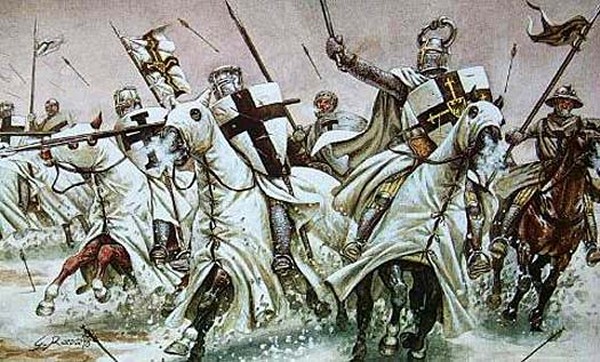
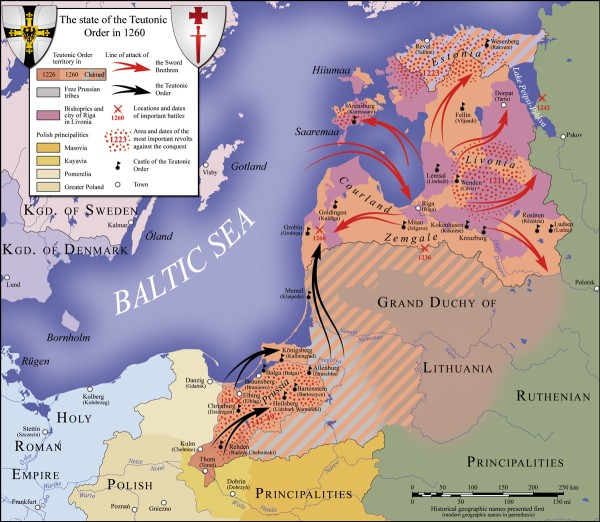
1260:
Highwater mark for Teutonic Knights. Oddly enough, as
the map shows, this territory is not adjacent to the vast
Holy Empire. Poland is inconveniently in the middle.
This would have interesting consequences 400 years later in
1701.
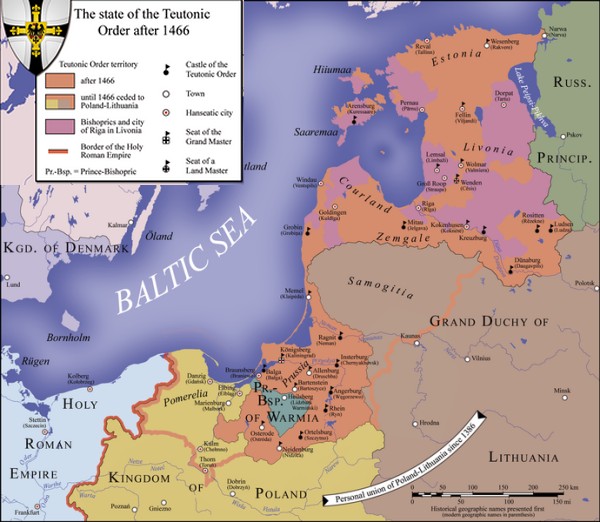
1466:
Teutonic Knights have just lost the 13 Years War to Poland.
Their territory is shrinking, their power is in decline.
The Knights have many enemies and no allies other than the
Holy Roman Emperor. This explains why they turned to
"diplomacy" instead of their usual aggressive policies.
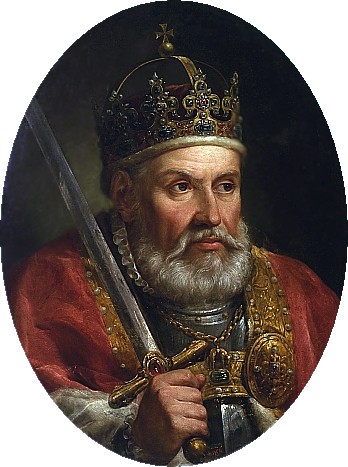
Polish
King Sigismund
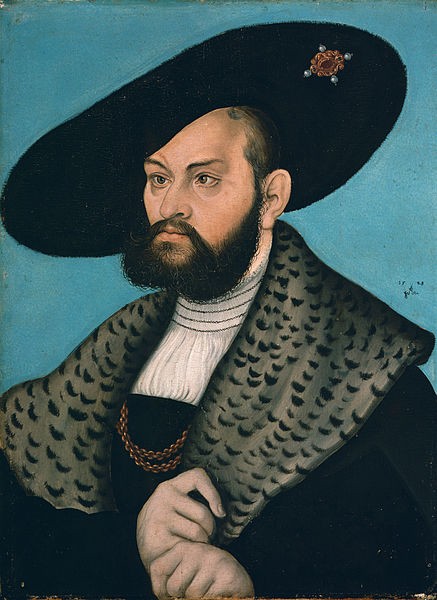
Albert, a member of the Brandenburg-Ansbach Hohenzollerns,
the man who became the first Duke of Prussia .
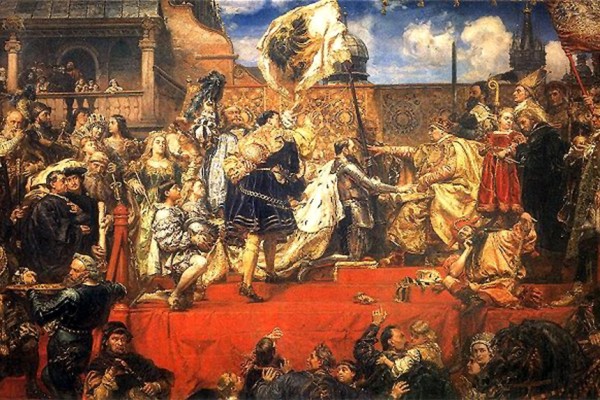
The
Prussian Homage, 1525.
Here
Albert is pledging loyalty to his uncle King Sigismund of
Poland. In return, he becomes the first Duke of
Prussia. Prussia now becomes an ally and vassal state
to Poland.
Albert's stunning betrayal of the Teutonic Knights, his
employers, paved the way for the rise of Prussia, the rise
of Hohenzollerns, and would open the door for Germany's
Unification 300 years from now.
|
It was win-win for both sides.
In return for Albert's
help in getting rid of the hated Teutonic Knights, Sigismund
had just handed the Hohenzollern family the keys to the
entire Kingdom of Prussia!!
Albert's incredible move to obtain the Duchy of Prussia
would pave the way for the rise of the House of
Hohenzollern. Furthermore, due to his renunciation of
the Teutonic Order, Albert could now marry and produce legitimate
heirs... which he did.
Albert is therefore seen as the father of the Prussian
nation. He was indirectly responsible for the eventual
unification of Germany.
|
|
|
|
Brandenburg-Prussia
|
Brandenburg-Prussia was the term used for the Brandenburgian Hohenzollern
dynasty between 1618 and 1701.
After Albert's bold move to become the First Duke of Prussia
in the 1525, the connection between the Brandenburg
and Prussian territories was one of distant
relatives. The Hohenzollern family had grown so large
there was one line ruling in Brandenburg and another line
ruling in Prussia.
It would take two more generations to bring the two
territories under one roof. Anna,
granddaughter of Albert I and daughter of Prussian Duke
Albert Frederick (reigned 1568–1618), married her cousin
Prince Elector John Sigismund of Brandenburg.
This union paid immediate dividends. One immediate benefit of the
familial intermarriage between Anna and John Sigismund came the
Treaty of Xanten.
A dispute was settled in the
Lower Rhine town of Xanten in 1614 between Wolfgang William,
Duke of Palatinate-Neuburg and John Sigismund,
Elector of Brandenburg, with representatives from England
and France serving as mediators.
The Treaty of Xanten ended the hostilities between Wolfgang William
and John Sigismund. Based on the terms of the treaty,
Wolfgang William received Jülich-Berg and Ravenstein.
In return, John Sigismund received the territories of
•
Cleves-Mark
•
Ravensberg
These
territories were the first provinces at the Rhine and in
Westphalia to be governed by the Hohenzollerns. They would
become the oldest constituents of the future Prussian
Rhineland and the future Province of Westphalia.
This was a prime example of how the Hohenzollerns were slowly
putting the German jigsaw puzzle together.
Upon the death of Albert Frederick in 1618, who died without
male heirs, John Sigismund was granted the right of
succession to the Duchy of Prussia through Anna.
The next step had been in the planning for two generations.
The Prussian line of the family died off without a male heir
in 1618. No problem. The main branch of the
Hohenzollern family had been intermarrying with the branch
ruling the Duchy of Prussia for the past 100 years.
The death of Albert Frederick allowed John Sigismund representing the main
branch to secure succession in Prussia upon the extinction
in the male line in 1618.
From this time on, the Duchy of Prussia was now in personal union
with the Margraviate of Brandenburg.
From this point on, the Elector of Brandenburg and
the Duke of Prussia would be the same person.
The resulting state,
known as Brandenburg-Prussia, consisted of
geographically disconnected territories in Prussia,
Brandenburg, and the Rhineland lands of Cleves and Mark
(see map).
The House of Hohenzollern was definitely on the rise.
One by one, various territories were coming under
Hohenzollern control.
1618 also marked the start of the Thirty Years
War.
Depending on one's point of view, the Thirty Years War was
both devastating and incredibly helpful to the
Hohenzollerns.
The Duchy of Brandenburg (which roughly correlates to
East Germany and Berlin from the Cold War era) was the scene of much of
the fighting. Both the Protestants and Roman Catholics
wanted control of this valuable property. As a result
Protestant and Catholic armies swept the land back and
forth.
The Elector would change hands three times,
there was brutal killing, burning, seizing men and taking
the food supplies. Upwards of half the population was dead
or dislocated. Berlin and the other major cities were
in ruins. Recovery would take decades.
On the other hand, the 1648 Peace of Westphalia which
ended the Thirty Years' War brought four new territories
under Hohenzollern control. Brandenburg
gains in 1648:
•
Minden (1648)
•
Halberstadt (1648)
•
East Pomerania (incorporated in 1653)
•
Duchy
of Magdeburg (incorporated in 1680).
These acquisitions during the second half of the 17th century laid the basis for
Prussia to become one of the great players in European
politics later on.
Another major factor in Prussia's rise was Frederick William
(1620-1688). Frederick William became the Elector of
Brandenburg (and Prussia as well) in 1640 near the end of
the Thirty Years War. He was an extremely
talented man.
It was Frederick William's job to get the devastated
Brandenburg back on its feet at the conclusion of the war.
|
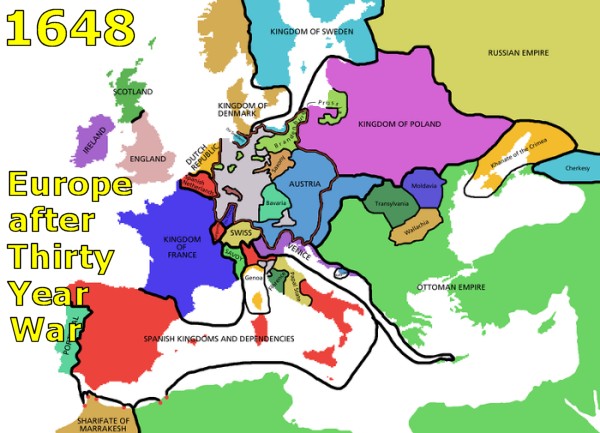
If one
looks carefully, the Duchy of Prussia and the Margraviate of
Brandenburg can be seen bordering the giant Kingdom of
Poland.
Meanwhile, "Germany" is nearly a complete vacuum occupied by
300 or so separate nation-states too small to be seen on the
map.
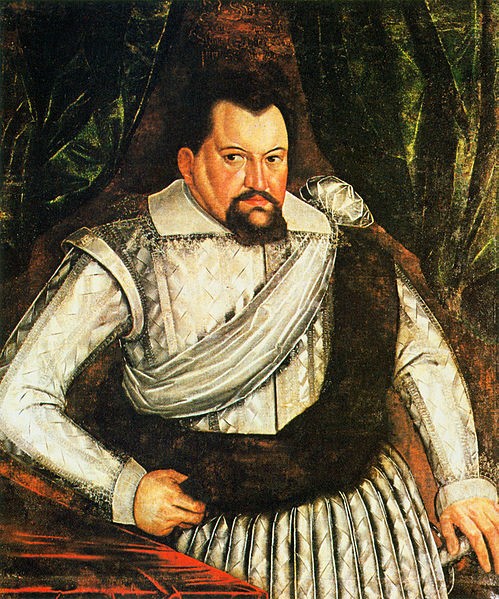
John
Sigismund
(1523-1619), Prince-Elector of Brandenburg and the eighth
Hohenzollern to rule over Prussia, but the first of his line
to rule over Brandenburg and Prussia simultaneously.
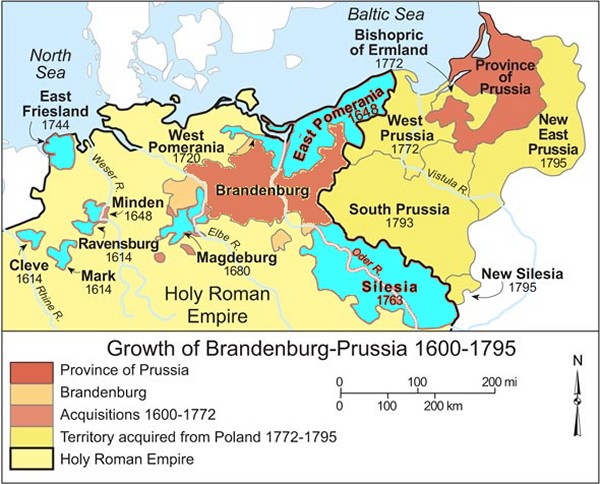
This
map shows how widely scattered the Brandenburg-Prussia
holdings were. The properties stretched from the Rhine
to Russia. Berlin, the capital of Brandenburg, was 340
miles from Konigsberg, the capital of Prussia.
|
Frederick
William's first move was to
open Brandenburg to large-scale immigration of
mostly Protestant refugees from all across war-torn Europe.
This key maneuver helped to replenish the population
in Brandenburg much more quickly.
Frederick William,
known as "The Great Elector", took other measures as
well. He started to centralize
Brandenburg-Prussia's administration and reduce the
influence of the separate estates existing within its
borders. In other words, someone had
finally begun to consolidate the bits and pieces of Germany
rather than divide further.
Frederick
William was a military commander of wide renown, and
his standing army would later become the model for
the Prussian Army. He is notable for his joint
victory with Swedish forces at the Battle of Warsaw
(1656), which some say marked "the beginning of
Prussian military history",
The emerging Brandenburg-Prussian military potential,
based on the introduction of a standing army in 1653, was
further responsible for widely noted victories at Fehrbellin (1675) and the
Great Sleigh Drive (1678).
Frederick
William was skilled in more ways than simply
war. He saw the importance of trade and promoted it
vigorously. Indeed, his legacy is practically
flawless.
Everyone agrees
his military build-up combined with shrewd domestic
reforms gave Prussia a strong position in the
post-Westphalia political order of north-central
Europe, setting Prussia up for elevation from duchy
to kingdom.
|
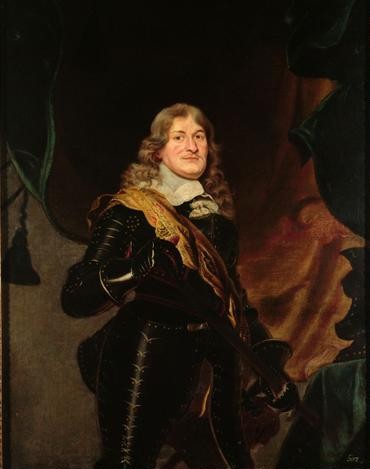 |
|
|
|
Frederick I Prussia
|
Frederick I (1657-1713) was the son of Frederick
William.
Frederick succeeded his father in Prussia and Brandenburg
upon his father's death in 1688. He would be an
effective ruler, but his time was unusually quiet. Although
the Prussian army took part in several different campaigns
to assist allies, there were no significant territorial
gains during his 25 year reign.
Frederick was best known for a major upgrade in Prussian
status.
1701 was a big year for Prussia. His father's victory in Warsaw
back in 1656 had removed the "vassal" status. It meant
Prussia was no longer under the control of Poland. It
was now a free state able to
do whatever it wanted.
In 1701 Frederick I decided it was time to
take a step up. He wanted to declare himself King of
Prussia.
Technically speaking, this was a no-no. According to
Germanic law at that time, no kingdoms could exist within
the Holy Roman Empire, with the exception of the Kingdom of
Bohemia.
Frederick persuaded Leopold I, Archduke of Austria and Holy
Roman Emperor, to allow Prussia to be elevated to a kingdom.
Frederick's argued that since Prussia had never been part of
the empire and the Hohenzollerns were fully sovereign over
it, it could now be ruled as a "kingdom".
In return for Hohenzollern assistance in the War of the
Spanish Succession and support for the Habsburg
candidate in the subsequent election, Holy Roman Emperor Leopold I
gave in to Frederick's request on one condition.
Leopold, a member of Habsburg family, would allow Frederick to crown himself "King in
Prussia", but not "King of Prussia".
Frederick smiled. Close enough. Deal.
The net result of Leopold's move weakened further the
authority of the emperor over the members of the Empire.
It compelled him to rely more and more upon his position as
ruler of the Austrian archduchies and of Hungary and
Bohemia.
As for Frederick, it marked the coming of age for the
Hohenzollern dynasty. The family was now stepping up
in class. Only the Habsburg family was more powerful.
As one can see, the paths of the Habsburgs and the
Hohenzollerns were crossing with increasingly regularity.
At this point, the Hohenzollerns were still loyal allies to
the Habsburgs, but that would soon change.
Prussia was on the move.
|
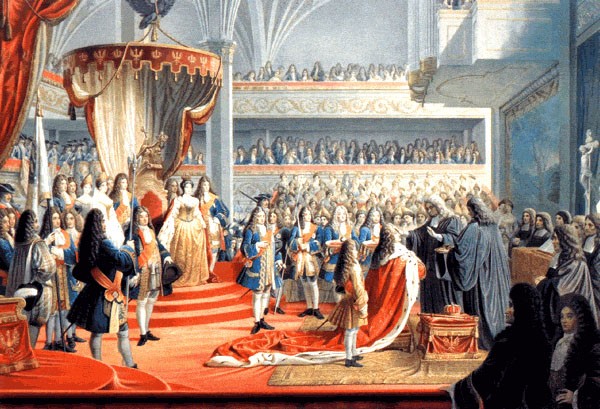
1701
Coronation of Frederick I in Prussia's Königsberg Castle.
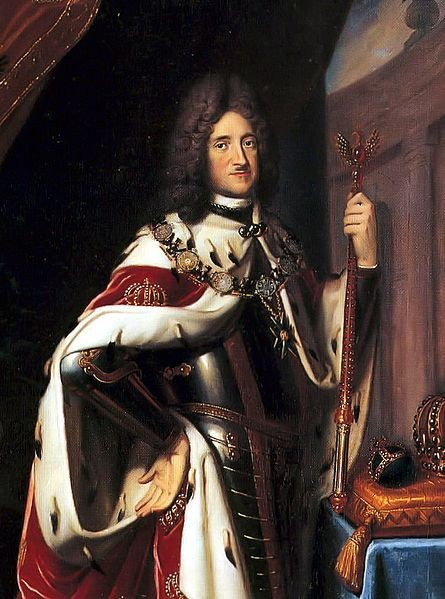
|
Austrian-Prussian Rivalry
|
Under Louis IV, the fabled Sun King, France had become
the leading power of Europe in the 17th century until his
death in 1715. However, under Louis V and
Louis VI, France's power declined under weak leadership.
It is no coincidence that Prussia's rise to power was aided
by
France's decline. With France increasingly distracted
by the rising power of its arch-enemy England, this gave Prussia
a free hand to take on Austria over control of the Holy
Roman Empire.
Now the stage was set for
Austria and Prussia to begin its long-standing conflict and rivalry
for supremacy in Central Europe during the 18th and 19th
centuries.
With Austria corresponding to Habsburg control and Prussia
to Hohenzollern control, both families understood there were
two major prizes. The Polish
territories seemed vulnerable and the grand prize were the
300 independent German-speaking political states up for
grabs.
Which family and which country would get the lion's share?
This rivalry was termed German dualism in the German
language area.
While wars were seen as part of the rivalry, it was also a race
for prestige to be seen as the legitimate political force of
the German-speaking peoples.
The Habsburg family was watching with amazement and alarm at
the Hohenzollern progress. The Hohenzollerns were
gathering up small states at a regular clip. For
example, East Frisia, a small state located in the
northwest corner of Germany near Hamburg, willingly gave up
its independence to Prussia in 1744.
The region was taken over by Prussia after the last Cirksena
prince had died without issue. There was no resistance to
this takeover since Prussia promised to honor the
traditional autonomy of the Frisians. It had all been
arranged by contract beforehand.
The Prussians preferred to use money, respect and
negotiation wherever possible. However, they didn't
mind using their army as well. The Prussians were born
for military service. More than likely, the 300 years
of domination by the militaristic Teutonic Knights had left
an indelible stamp on the people.
After Frederick I came Frederick William (1713–1740),
a real nut case. Biographer Jerome Blum wrote this
about him:
Uncontrollably
violent in temper, vulgar in speech and manner, scornful
of education and culture, and so deeply pious that he
considered theaters "temples of Satan."
He made a fetish of
cleanliness, washing and grooming himself many times
each day.
At the the same
time, this royal neurotic was the most remarkable
reformer of his dynasty....He was the real father of
Prussian militarism and Prussian bureaucratic
efficiency.
Frederick William, the austere "Soldier
King", was the creator of the vaunted Prussian bureaucracy
and the professional standing army. Under his careful eye,
the Prussian military developed into one of the most
powerful fighting forces in Europe.
One statesman
commented on the size of the army in relation to the total
population by saying "Prussia is not a state with an army,
but rather an army with a state".
Frederick William participated in the Great Northern
War, a conflict between Sweden and Russia. He was
determined to gain the Oder estuary with its access to the
Baltic Sea for the Brandenburgian core areas, which had been
a state goal for centuries.
•
Frederick William
was rewarded for his efforts with the acquisition of Swedish
Pomerania in 1720.
Frederick William is noted for one other thing.
He was the father of Prussia's Frederick the Great.
Frederick William was determined to make his son
become a fine soldier. One never knows how to create genius in a child, but there
can be no doubt Frederick William used some very
strange techniques in raising his gifted child.
|
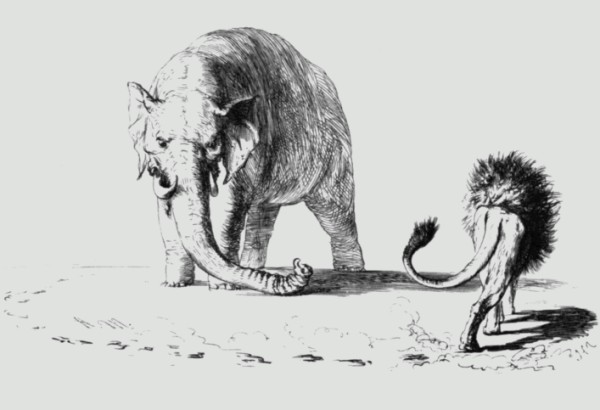
The
Prussian lion circles the wary Austrian elephant.
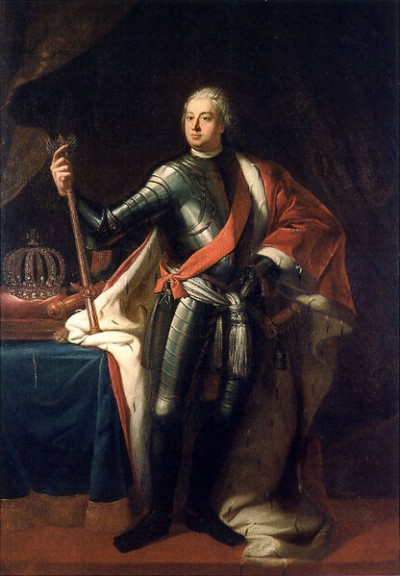
Frederick William (1713-1740).
His
son Frederick the Great would become one of the dominant
leaders of the Eighteenth Century.
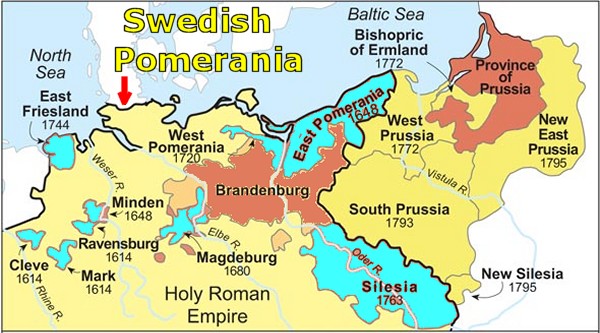
Frederick William acquired Swedish Pomerania in 1720
|
As a small child, young Fritz was
awakened each morning by the firing of a cannon. At the age
of 6, Fritz was given his own regiment of children to drill
as cadets. One year later, Fritz was given a miniature
arsenal to play with.
Frederick William would frequently mistreat Fritz. The
father did this to force his son to learn how to be tough. Fritz
was beaten for being thrown off a bolting horse and for wearing
gloves in cold weather. Nothing like tough love,
right?
Not surprisingly, the child decided to rebel against his
harsh treatment. When the prince turned 18, he failed
in his attempt to flee to England with his tutor. The
livid king nearly executed his son for "desertion".
Eventually the father decided a better punishment would be
to force his son to watch the tutor be executed. Frederick
fainted on the spot at the horror of seeing his closest
friend decapitated.
Then the father had the prince court-martialed and thrown in
jail for good measure. Like we said, the man was a
serious nut case.
|
| |
Frederick the Great
|
Prince Frederick (1712-1786) was twenty-eight years
of age when his father Frederick William I died.
Frederick acceded to the throne of Prussia in 1740.
Frederick was an interesting figure. As a young man,
he was far more interested in music, arts and philosophy than he was
in world conquest. Perhaps he disdained the military
life due to his deep hatred of his cruel and authoritarian father.
For example, the works of Niccolò Machiavelli, such as
The Prince, were considered required reading for a
future king in Frederick's age. Frederick didn't care
much for Machiavelli. In 1739, Frederick
finished his Anti-Machiavel, an idealistic refutation
of Machiavelli's ideas. Frederick published his
thoughts anonymously in 1740, but Voltaire learned the truth
and distributed it in Amsterdam to great popularity.
Sadly, Frederick's years of dedication to the arts instead of
politics ended upon the 1740 death of Frederick William and
his inheritance of the Kingdom of Prussia.
That is when Frederick surprised everyone. Considering
he had just fashioned himself, the anti-Machiavelli, he
wasted no time attacking Silesia 5 months after taking power.
It was Frederick's goal to unite his disconnected lands.
With this in mind, Frederick fought wars mainly against
Austria, the power base of the Habsburg dynasty that had reigned
as Holy Roman Emperors almost continuously from the 15th
century until 1806. Frederick was fortunate to catch
Austria just as it had begun to decline. Frederick
would be able to establish Prussia as the fifth and smallest
European great power by using all the resources his strange
yet effective
father had developed.
|
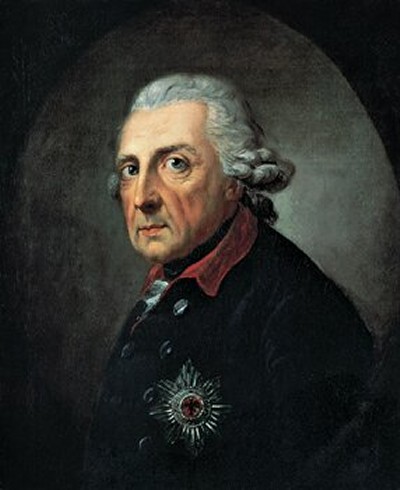 |
Silesia was a prized possession of Austria, the
supposed ally of Prussia. Just two years earlier Prussia and Austria had been allies in the War
of Polish Succession (1733–1738). However, that
all changed Charles VI, the Holy Roman
Emperor, died on 20 October 1740. His
death meant his daughter Maria Theresa could conceivably
become not only the reigning queen of Austria, but perhaps
even the first female Holy Roman Emperor.
A woman on
the throne? All of Europe was in an uproar.
While the Austrian Habsburg Monarchy was distracted by the
firestorm of arguments over allowing "a woman" to take power, Frederick saw an
opportunity to invade Silesia, the mineral-rich property adjacent to
the border of Brandenburg.
This territory, today a part of Poland, was
located directly south of the Brandenburg.
Frederick feared that Poland was just as interested in
adding this plumb territory to their kingdom as he was.
Control of Silesia would unite Saxony and Poland
on Brandenburg's southern border.
Frederick wasn't about to let that happen. So he took
everyone by surprise and launched a preemptive strike.
Austria mounted a creditable defense. However, Austria
was forced to retreat in 1741 when France suddenly attacked
on a different front. It was later learned that
Frederick had made a secret pact with France to make this
exact move.
|
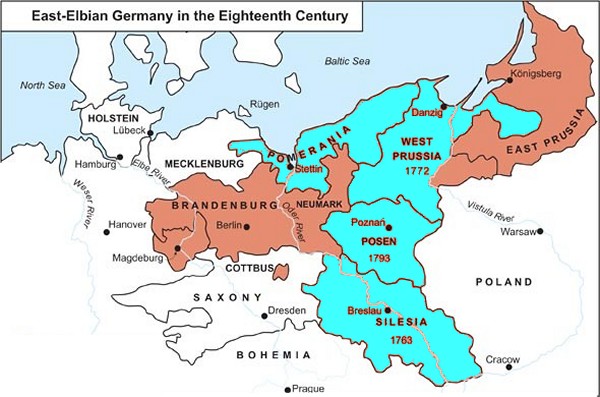
Silesia was coveted by Poland as a way to connect to Saxony.
Frederick simply beat Poland to the punch. Prussia
pretty much "owned" Silesia as early as 1741, but Austria
refused to give up trying to win the valuable territory back
until 1763.
|
Frederick may have been only 28, but he was off to quite a
start.
So what was going on here? The great powers of Europe
sensed the vast Austrian Empire was ripe for the pickings.
The Austrian Empire might have been large, but it was
overextended. Austria did not have enough armies to defend
all its territories.
Furthermore Maria Theresa was perceived as a weak woman
completely
incapable of inspiring her military or comprehending
strategy.
Frederick decided to test her immediately. By
coordinating with France
ahead of time to march on Austrian borders at a key point,
Frederick's trap worked like a charm. Austria was forced to recall
its armies from Silesia to defend Vienna instead. At
this point, Frederick had no trouble taking Silesia.
Prussia's attack on Silesia was part of a much larger
ongoing battle known as the War the Austrian Succession.
The Silesian Wars were a mere part of the larger
international conflict known as the "War of the Austrian
Succession" (1740-1748). It would take years of back and
forth fighting, but in the end Prussia prevailed and
retained its prize. Maria Theresa ceded Silesia to
Prussia in the Treaty of Aix-la-Chapelle (1748).
The end of the war sparked the beginning of the German
dualism between Prussia and Austria, which would ultimately
fuel German nationalism and the drive to unify Germany as a
single entity.
In a curious footnote to history, Frederick had once
proposed asking Maria Theresa to marry him. It would
be interesting to know what she would have thought of this
match.
As it turned out, Maria Theresa developed a powerful dislike
for Frederick. She had been obsessed with regaining
Silesia, but Frederick had matched every one of her moves.
Here is an interesting letter sent from Count Podewils, the
Prussian ambassador in Austria, to Frederick the Great at
the conclusion of the Austrian Succession War.
"Maria
Theresa has, as you well know, a terrible hatred for
France, a nation with which it is most difficult for her
to keep on good terms.
However,
she controls this passion except when she thinks to her
advantage to display it.
She
detests Your Majesty, but acknowledges your ability.
She cannot forget the loss of Silesia, nor her grief
over the soldiers she lost in wars with you."
|
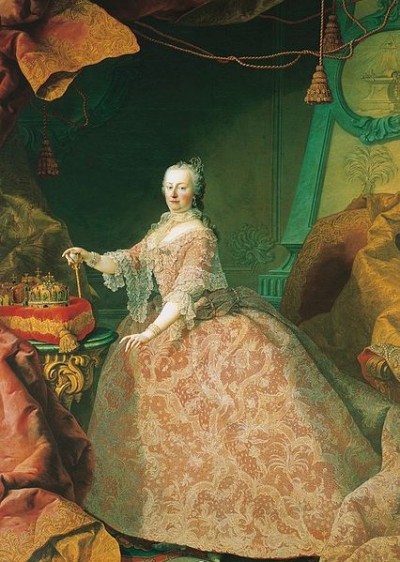
The
empress had a long reign which spanned 40 years. Some
historians have termed Maria Theresa as the savior of the
Habsburg Dynasty. Her efforts to transform her empire into a
modern state solidified the Habsburg rule. When she
came to the throne, her state appeared on the brink of
dismemberment. Maria Theresa provided a strong foundation
for the continuation of the Habsburg Dynasty into the modern
era.
|
1756-1763: Seven Years
War
|
The Seven Years War is sometimes described as the
first World War because all the great powers of Europe
squared off against each other and the United States of
America was involved as well.
|
Essentially the Seven Years War continued the growing
tensions between England and France as well as Prussia and
Austria.
Austria was still determined to get Silesia back.
Maria Theresa was able to form an imposing alliance of
France, Austria, Sweden, and Russia against Prussia. The
Russians and the Austrians were determined to reduce the
power of Prussia, the new threat on their doorstep.
Along with France, plans were made for a 1756 attack on
Prussia by Austria and Russia, subsidized by France.
Prussia's only real ally was England with its great navy,
but England could not help much in any battles fought on the
European continent. This meant it was basically
Prussia against the World.
|
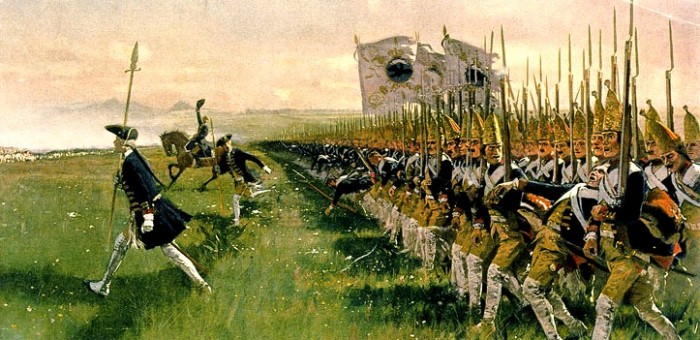 |
In
many ways, Prussia reminds us of famous warrior states.
Every young man born in Prussia knew he was destined for the
military. In that way, Prussia was very much like
ancient Sparta. However, a better parallel might be modern-day Israel.
Like
Prussia, Israel is a small country surrounded on every side by
fierce enemies and overwhelming numbers. However,
despite being heavily outnumbered, Israel is greatly feared
thanks to its powerful military.
Another thing Prussia and Israel have in common is a lot of
guts. Neither country is afraid to gamble. For
example, in a move highly reminiscent of Israel's pre-emptive strike
on Egypt in the 1967 Six Days War, Frederick decided
his best move was to attack first.
1956
Knowing full well that neighboring countries were conspiring
against him, Frederick was determined to strike first. On 29
August 1756 Frederick's well-prepared army crossed the
frontier and preemptively invaded Saxony. He
faced widespread criticism for his attack on neutral Saxony
and for his forcible incorporation of the Saxony forces into
the Prussian army after his successful occupation.
1957
Frederick's successful campaign in Saxony once again
established himself as Europe's premier general and his men
as Europe's most accomplished soldiers. In spite of these
successes, the Prussians were now facing the prospect of
four major powers attacking on four fronts (France from the
West, Austria from the South, Russia from the East and
Sweden from the North). Meanwhile a combined force from a
number of smaller German states such as Bavaria had been
established under Austrian leadership, thus threatening
Prussian control of Saxony. Things were looking very grim
for Prussia at this time.
1958
By this point Frederick had grown increasingly concerned
about the Russian advance from the east and marched to
counter it. On 25 August 1758, at the Battle of Zorndorf
a Prussian army of 35,000 men under Frederick fought to a
standstill a Russian army of 43,000. Although both
sides suffered heavy casualties and the Russians withdrew
from the field in good order, Frederick claimed a victory.
In the undecided Battle of Tornow on 25 September, a
Swedish army repulsed six assaults by a Prussian army, but
did not push home an attempt to move on Berlin following the
Battle of Fehrbellin.
During this back and forth year, Prussia was clearly tiring
from being forced to battle on four fronts.
1759
The year 1759 saw some severe Prussian defeats. At the
Battle of Kay, the Russian Count Saltykov with 47,000
Russians defeated 26,000 Prussian troops commanded by
General Carl Heinrich von Wedel.
Though the Hanoverians (a Prussian ally) defeated an army of
60,000 French at Minden, Austrian general Daun forced the
surrender of an entire Prussian corps of 13,000 men in the
Battle of Maxen.
Frederick himself lost half his army in the Battle of
Kunersdorf, the worst defeat in his military career, and
one that drove him to the brink of abdication and suicide.
The disaster resulted partly from his misjudgment of the
Russians, who had already demonstrated their strength at
Zorndorf and at Gross-Jägersdorf.
1760
1760 brought even more disasters to the Prussians. The
Prussian general Fouqué was defeated in the Battle of
Landshut. The French captured Marburg, and the Swedes
part of Brandenburg-Prussian Pomerania.
The Hanoverians were victorious over the French at the
Battle of Warburg, their continued success preventing
France from sending troops to aid the Austrians against
Prussia in the east. Despite this the Austrians, under the
command of General Laudon captured Glatz (now Klodzko) in
Silesia.
In the Battle of Liegnitz Frederick scored a victory
despite being outnumbered three to one.
The Russians under General Saltykov and Austrians under
General Lacy briefly occupied his capital, Berlin, in
October. The end of that year saw Frederick once more
victorious, defeating the able Daun in the Battle of
Torgau, but he suffered heavy casualties and the
Austrians retreated in good order.
1761
Prussia began the 1761 campaign with just 100,000 available
troops, many of them new recruits.
The Russians under Zakhar Chernyshev and Pyotr Rumyantsev
stormed Kolberg in Pomerania, while the Austrians
captured Schweidnitz. The loss of Kolberg cost
Prussia its last port on the Baltic Sea. As the Prussian
armies had dwindled to just 60,000 men, Frederick's survival
was severely threatened.
|
January 1762 - The End
is Near
In Britain, it was speculated that a total Prussian collapse
was now imminent. Britain now threatened to withdraw
its subsidies if Prussia didn't seriously consider offering
to make concessions to secure peace.
Truth be told, Frederick had clearly bitten off more than he
could chew.
Facing a coalition which included Austria, France, Russia,
Saxony, Sweden and several minor German states, over the
next several years Frederick narrowly kept Prussia in the
war. By 1962, with his territories repeatedly invaded
on all sides, Frederick assumed that this was the end.
On 6 January 1762, Frederick wrote to Count von Finckenstein,
"We ought now
to think of preserving for my nephew, by way of negotiation,
whatever fragments of my territory we can save from the
avidity of my enemies"
In other words, Frederick was resolved to seek a soldier's
death on the first opportunity. Amazingly, one step
from his last gasp, Frederick received the gift of a
lifetime.
|
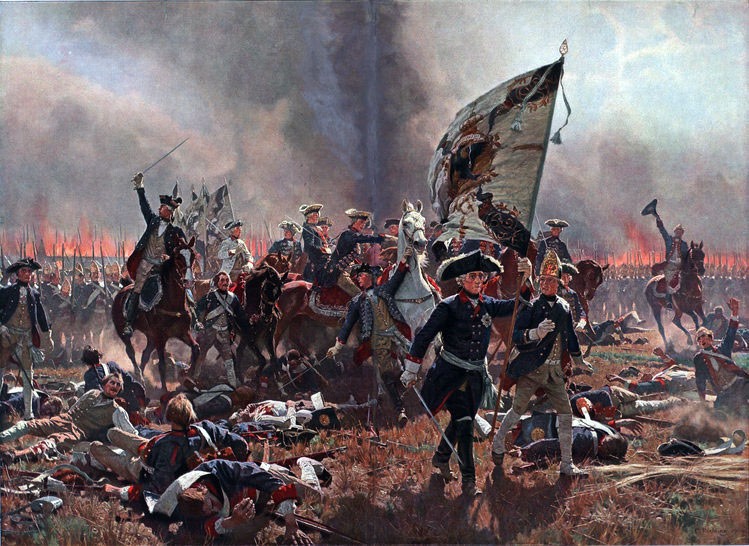 |
Without warning, the Russia Tsarina died.
The sudden death of Empress Elizabeth of Russia in January
1762, led to the succession of Peter III to the Russian
throne.
|
The new tsar was a great admirer of Frederick and decidedly
"pro-Prussian". On his orders, Russia's attack on
Prussia evaporated. Now that Russia was gone, this
event led to the collapse of the anti-Prussian
coalition.
As an interesting footnote, Peter III was Tsar
for all of six months. Peter III was, shall we say,
basically unfit for rule. Indeed, his move to call off
the war was extremely unpopular back in Russia. The
ruling class was fully aware that dangerous Prussia had been
on the ropes. They were horrified to see Russia let
Prussia survive once it was cornered. Put the stake
through the vampire while you can.
Nope, too late. Prussia was safe thanks to this stroke of
fortune known as the "Miracle of the House of
Brandenburg". Frederick was free to rise again.
This unconscionable mistake led to widespread resentment towards Peter back in
Russia.
Noting just how unpopular the public sentiment
was towards her husband, Peter's wife
Catherine the Great persuaded her boyfriend at the
time to
eliminate the Tsar. Peter's murder cleared her way to
become the next Tsarina. Isn't history interesting??
As for Frederick, although he did not gain any territory in
the Seven Years War, he had survived to live another
day. Indeed, the performance of the Prussian military
against all odds, his ability to retain Silesia, and his
amazing series of cat-like escapes made Frederick
extremely popular throughout the countless German-speaking
territories.
Meanwhile Empress Maria Theresa looked on with astonishment.
Foiled again. Maria Theresa would spend the rest of
her life claiming Frederick was a wicked man with a bad
heart who robbed Austria of Silesia and the alliance against
him had been his own fault.
She was right of course. Frederick clearly had a
wicked streak. But damn he was good.
|
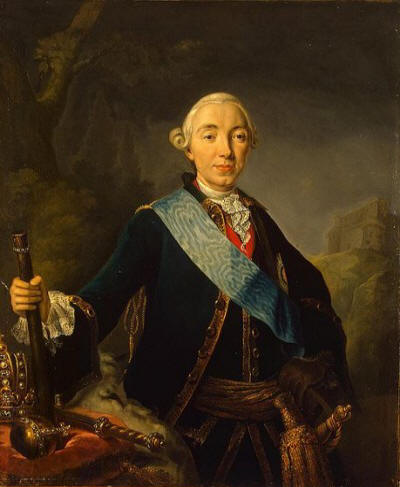
Tsar Peter
III |
The Polish
Partition
At the end of the
Seven Years War (1763) Prussia was still
scattered across Europe.
Frederick is best remembered as a brilliant military
strategist, but he was also a realistic statesman. He
believed creating alliances was necessary, as Prussia did
not have the seemingly limitless resources of places like
France or Austria.
Frederick understood that for Prussia to
survive, he had to make deals.
Increasingly, all the talk in Europe revolved around the
phrase "Balance of Power".
The idea was to distribute military defense pacts so that no one state
was strong enough to
dominate all others by itself.
If one state gained inordinate power,
the theory predicted that it would use its
strength to attack weaker neighbors.
Every nation understood that those who stood alone risked
being conquered, so they made mutual defense alliances
promising to come to each other's aid if attacked. This
practice is said to have triggered the start of World War I.
But that's another story.
|
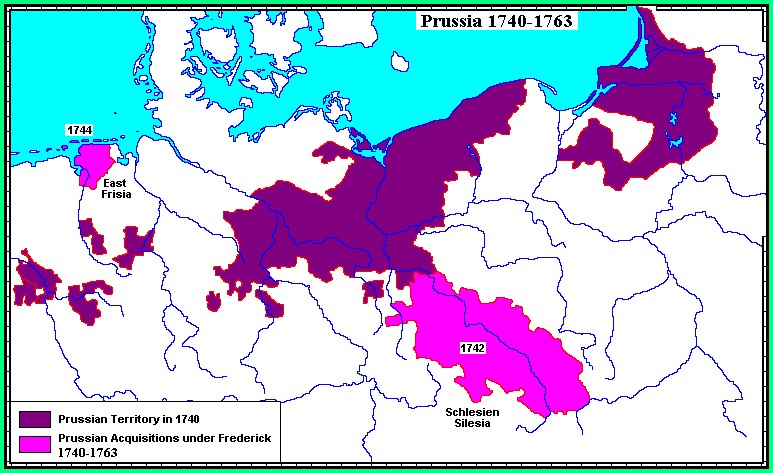
The
gap separating Brandenburg from Prussia had been a source of
irritation to Prussian rulers dating all the back to 1525
when Brandenburg first acquired Prussia.
Frederick had written it was his life's dream
to obtain the land necessary to unite the separate
territories. Once the Seven Years War was over, he intended
to do something about it.
|
Two people who clearly did not like each other were
Frederick and Catherine the Great.
Frederick knew
Empress Catherine II of Russia was staunchly opposed to
Prussia. She still couldn't believe her idiot husband
had let Frederick off the hook.
For that matter, Frederick opposed Russia as well. He
remembered with chagrin how Russian troops had been allowed
to freely cross the Polish-Lithuanian Commonwealth during
the Seven Years War to attack Prussian homeland. He
hated the Russians and was desperate to obtain control of
certain Polish lands that would guarantee greater national
security from Russian attack.
One thing that has always amazed people about European
politics is the ability of bitter enemies to occasionally
work together despite their hatred. For example,
France's entry into the First Silesian War against Austria
had effectively handed Silesia to Prussia. Maria Theresa hated
France to the bottom of her soul for their treachery.
And yet eight years later, guess who became allies?
You guessed it. France and Austria decided to unite and gang up on Prussia in the Seven Years War.
In a similar manner, despite their personal hostility, Frederick
and Catherine had signed a defensive alliance in 1764.
This pact guaranteed Prussian control of Silesia in return
for Prussian support for Russia against Austria or the
Ottoman Empire. Both countries were more worried about Austria
and Turkey than each other. Considering alliances like
these changed at the blink of an eye, no country felt safe.
The threat of a secret alliance like the Prussian-French
trick in the First Silesian War kept statesmen awake at
night with fear.
So maybe Russia and Prussia were allies at the moment, but
Frederick kept a close eye on Russia nonetheless. Russia had been
a backwards nation lagging far behind the rest of Europe for
centuries. Now, thanks to a series of smart moves,
under Catherine, Russia was just now beginning to flex its
giant muscles.
As a side note, Catherine the Great and Frederick the Great
both clearly deserved the title of "Greatness". What
they did for their respective nations was incredible.
One can only wonder what these two gifted leaders living
side by side could have accomplished if they had trusted
each other enough to team up. If so, a Texas boy like
myself just might be speaking Russian now... or maybe
German.
But let's get back to our story. Now that his Kingdom was safe
following the Seven Years War, Frederick pondered his next
move. Frederick couldn't take his eyes off Poland.
The territory was a sitting duck and Frederick had a good
aim.
Frederick wanted to find a way to annex
the Polish territory that separated the two areas both to
unite his divided kingdom and to provide more national
security against any future Russian invasion.
Only one problem... what would Russia and Austria do if
Prussia moved on Poland?
Prussia, Russia, and Austria all coveted the Polish lands
that were there for there for the taking. But before
making a move, each country worried what the other two would
do. They stared at each other with fear and suspicion.
Each country knew that any Polish land grab would be opposed
by the other two powers. No one wanted to risk
provoking a two against one showdown.
|
So Frederick had a clever idea. Why not simply divide
Poland into three slices and each power take a slice?
That way they wouldn't have to go to war. So, under
pressure from Prussia, the three powers agreed on
the First Partition of Poland (1772).
Doesn't it seem strange that Poland was so cooperative while
being carved into three little pieces? As it turns out,
Poland had pretty much become a Russian protectorate over
the past century. Russia didn't "own" Poland, but it called all the shots.
Indeed, the current King... as well as the "Last King"...
was Stanislaw Poniatowski. Stan had been elected to
the position by the Polish nobles in 1764 thanks to the
support of Catherine the Great who "recommended him highly".
As it turns out, Catherine had a very high opinion of Stan
for a special reason. About 20 years earlier they had been
lovers. Catherine had gotten Stan this job as a
convenient way to end the affair. So when the issue of
the Polish Partition came up, all Catherine had to do was
smile and Stan went right along with the deal. Poof!
Polish independence went down the drain... which explains
why Stan was the last king Poland ever had.
In case you might be curious, Poland would not regain its
independence until the end of World War I. This took
place when the allies
ripped Poland away from Germany as one of many punishments
for starting the war.
|

The
annexation of
Royal
Prussia,
aka West Prussia, in 1772 accomplished Frederick's long-held
desire to link Brandenburg to Prussia.
|
The annexation of Royal Prussia in 1772 would mark Frederick's
final land acquisition.
Frederick had every reason to smile. He had finally
accomplished his lifelong dream and had even managed to do it
without bloodshed. Even better, as one can see from
the map, Royal Prussia was a giant piece of property
obtained basically "for free".
This brilliant move was yet another reason why Frederick was
widely admired... or greatly feared... throughout Europe.
Frederick had not only put Prussia on the map for good, the
country was now united and perfectly positioned to expand in
any direction it wanted to go.
Frederick's military victories and land acquisitions were
not his only triumphs. Once the Seven Years War
ended, Frederick was free to attend to matters of state.
He helped transform Prussia from a European backwater to an
economically strong and politically reformed state. His
conquest of Silesia gave Prussia's fledgling industries
access to raw materials. He protected industries with high
tariffs and minimal restrictions on domestic trade. He
promoted an advanced secondary education, the forerunner of
today's German grammar school system, which prepares the
brightest pupils for university studies. He made it possible
for men not of noble stock to use education to become judges
and senior bureaucrats. He
modernized the Prussian bureaucracy and civil service and
promoted religious tolerance throughout his realm. He
reformed the judicial system and abolished most uses of
judicial torture. It is said
that Prussian justice became the most prompt and efficient
in Europe.
In other words, Frederick's 46 year career as King of Prussia
was a remarkable one by practically any measure.
But he left a strange legacy behind. Frederick had an
intense dislike of the Polish people and the Jews. Nor
did he keep his opinions to himself. Frederick had
despised Polish people since his youth. Numerous
statements are recorded in which he expressed his anti-Polish
prejudice, calling Polish society "stupid" and stating that
"all these people with surnames ending with "-ski" deserve
only contempt".
He described Poles as "slovenly Polish trash". Once Prussia
acquired its Royal Prussia territory from Poland,
Frederick made life miserable for Poles living in that area. Frederick
invited thousands of German immigrants to the province,
openly expressing the hope they would displace the Poles
permanently. One can only wonder if Frederick ever
pondered more serious measures. Hmm. Doesn't
that remind us of someone?
Yes, it does.
It doesn't take much of an imagination to see why Frederick
was Adolph Hitler's personal hero.
Adolph Hitler obviously studied Frederick the Great's career
very carefully. Indeed, Hitler was
quoted as saying, "Despite all Napoleon's genius, Frederick
the Great was the most outstanding man of the eighteenth
century."
Hitler would spend his entire life hoping to be "the next
Frederick".
•
Hitler's desire to create the Master
Race parallels Frederick's disdain for the
impurities caused by the Poles and Jews in a highly
disturbing way.
•
Hitler's desire to unite all the
Germanic people by whatever means necessary seems identical to
Frederick's similar goals.
•
In fact, some historians have pointed out that Hitler's
refusal to surrender when all hope was gone may have been
rooted in his belief that some miracle rescue would come
along in the same manner as Frederick's "Brandenburg
Miracle".
|
Today Frederick is
regarded as one of the great geniuses of military history.
He and Napoleon are
clearly the most admired military leaders studied in the
well-regarded military treatise On War written by
Clausewitz.
Clausewitz praised Frederick's use of the
oblique order to attack numerically superior forces plus
Frederick's quick and skillful movement of the Prussian
troops.
Frederick had other strengths as well. He was brilliant at
preventing the unification of numerically superior opposing
armies. He had a keen ability to arrive at the right
place at the right time to keep enemy armies out of vital
Prussian territory at the last moment.
As the map indicates,
following Prussia's conquest of Silesia,
Brandenburg-Prussia territories were scattered
across Europe in seven different places.
A quick glance at the map reveals
Prussia had nowhere near the land resources of countries
like France, Russia, Spain and Austria.
Even with Silesia,
Prussia was small in comparison to the great powers of
Europe. This means Frederick's accomplishments were
even more impressive considering that Prussia had such a
size disadvantage.
|
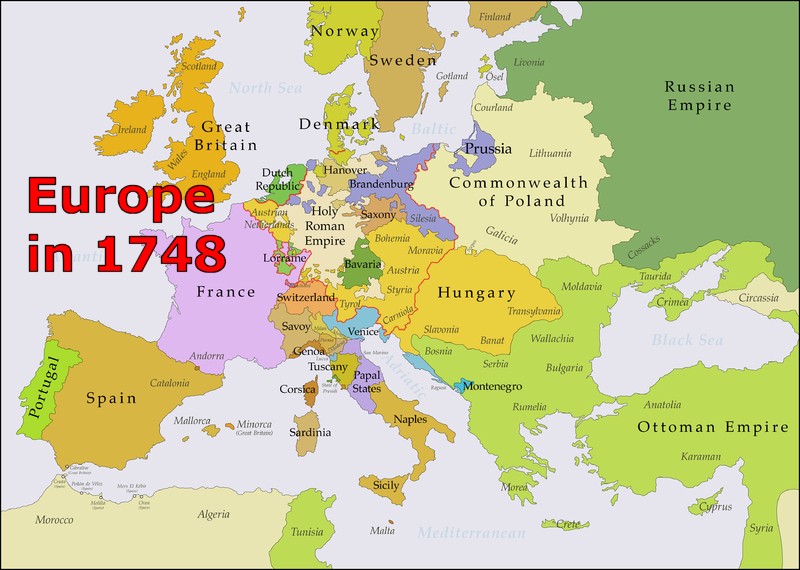
Silesia was Frederick's greatest triumph, but he wanted
more. Note that the Prussian territory was divided into seven
different segments in 1748. Frederick wanted to unite all those
pieces, but he was determined to begin by uniting Prussia and
Brandenburg. That meant that sooner or later Poland was in trouble.
|
This fact alone makes
one realize Frederick was taking quite a chance taking on
much larger enemies such as Austria, Russia and Poland.
This guy was willing to roll the dice.
Frederick wasn't just a
smart man, he was also a brave man. He frequently led
his military forces personally. Over time, he had six horses
shot from under him during battle.
His courage, his
intelligence, and his statesmanship are testimony to his
greatness. To accomplish what he
did with so little explains why history has been kind to
Frederick.
Napoleon Bonaparte was
17 when Frederick died. Napoleon studied Frederick
closely and became a great admirer of Frederick.
Bonaparte viewed the Prussian king as the greatest tactical
genius of all time.
After Napoleon's
victory of the Fourth Coalition in 1807, he visited
Frederick's tomb in Potsdam he remarked to his officers,
"Gentlemen, if this man was still alive, I would not be
here".
A very fitting tribute
indeed.
|
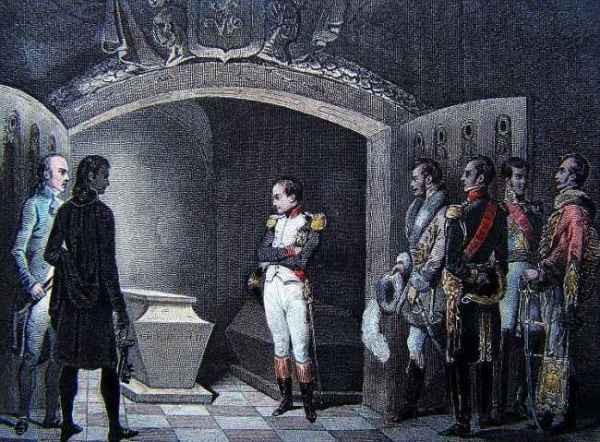 |
|
|
|
Prussia
After Frederick
|
Following Frederick's death in 1786, Poland proved to be the
gift that kept on giving.
After the First Partitions took place in 1772, the Poles
living in the Russian sector were miserable.
Emboldened by the 1789 French Revolution, they attempted to
regroup and try to win back their freedom from Russia.
However, they knew Russia would likely intervene, so they
recruited their next door neighbor Prussia to be their ally.
The Polish-Prussian Pact of 1790 was signed, giving
hope that the Polish Commonwealth had found a powerful ally
that would shield it from Russia while the country
reorganized.
|
Empress Catherine was clearly angered at this bold move.
How dare Poland try to do anything without Russia's
permission!!
Arguing that this upstart Poland had fallen prey to the "dangerous ideas"
emanating from France, Catherine ordered Russian
forces to invade the Commonwealth in 1792.
And what about Poland's formidable ally? Well, mighty
Prussia took one look at the Russian forces moving in to
Poland and stepped back. Poland was on its own.
Poor Poland. They had chosen the wrong country to be
their ally.
Obviously Poland's rebellion folded like a wet rag.
But then Prussia did something interesting. Just as
the Russian forces were ready to withdraw, Prussia asked
Russia for more territory as "compensation" for not lifting
a finger in Poland's defense.
Catherine the Great was astonished at Prussia's nerve to
expect territory in return for doing nothing. But then
she shrugged. Why not? This was an excuse for
Russia to "legally" annex more Polish territory, so she
threw Prussia a bone to shut them up.
And what a bone it was. In 1793 Prussia received Posen,
a gigantic slice of territory given in return for doing
absolutely nothing other than betray its ally and stick out
its hand.
|

The
annexation of
Posen in 1793
linked
Royal
Prussia
in the north to
Silesia
in the south.
|
This would be the only clever move ever made by Frederick
William II, Frederick's successor.
A
likely homosexual, Frederick the Great had left no heirs.
What a shame, because his nephew Frederick William II
definitely took his eye off the ball. Pleasure-loving
and indolent, he is seen as the complete antithesis to his
illustrious predecessor.
Fred was a lover, not a fighter. Fred hated all things
military and turned all war details over to the officers the
moment he was crowned in 1786. At this point, the once
vaunted Prussian army began to slack off. Not one
notable victory took place during Fred's reign of
womanizing.
Yes, Frederick William II had a definite weakness for women.
In addition to fathering seven children by his second wife
Frederica, he spend considerable time with his lovely
mistress Wilhelmine, by whom he fathered five more
children. In addition, he fathered yet seven more
children with two other mistresses. That makes 19
children if anyone is counting. One has to wonder if Fred
knew all their names.
When Fred wasn't in the arms of his wife or his endless
string of mistresses, he could be found practicing the cello
and playing Mozart tunes with his beloved private orchestra.
How this man found time to attend to the affairs of state is
a good question. The answer is a simple one. Fred
didn't pay much attention to anything other than women and
song.
In the end, other than his potent sperm, it could be said Fred had only one
real talent - he was a master at being unfaithful.
Ironically, this proved to be his secret weapon in politics
as well. Fred's only positive accomplishment -
acquiring Posen - came to Prussia through betrayal.
Let's hear it for the cheater!
Frederick
William III
After Fred the Dread, the next batter up was Frederick
William III (1770 - 1840). He was king of Prussia
from 1797 to 1840. Unlike his father, Frederick
William III was a good man.
He was a melancholy boy, and with good reason. He was
completely ignored by his parents. His father was far
too busy chasing mistresses up and down the halls of the
palace to pay attention to his son, so Frederick was raised
by tutors. Disgusted by what he saw, young Frederick
grew up pious and honest.
Frederick William III received the usual extensive
military training expected of a Prussian prince. In
1793, Frederick William married Luise of Mecklenburg-Strelitz,
who bore him ten children. From his palace in Berlin,
Frederick William lived a civil life with a problem-free
marriage. His wife Luise was particularly loved by the
Prussian people, which boosted the popularity of the whole
House of Hohenzollern, including the King himself.
Frederick William succeeded to the throne in 1797.
Disgusted with the moral debauchery of his father's court
(in both political intrigues and sexual affairs), Frederick
William's first endeavor was to restore morality and dignity
to his dynasty.
The new King showed that he was earnest about his good
intentions. He reduced the expenses of the royal
establishment, dismissed his father's ministers, and
reformed the most oppressive abuses of the late regime.
Although Frederick William tried very hard to be a good
king, he was unlucky in three ways.
First, his father's deadbeat reign had seen the vaunted
Prussian military lose its pride.
Second, he lacked genuine talent. He had the
Hohenzollern determination to retain personal power but not
the Hohenzollern genius for using it. Too distrustful to
delegate responsibility to his ministers, he lacked the will
to strike out and follow a consistent course for himself.
Instead of acting, he reacted. Unfortunately this made
him a step too slow to succeed.
His final stroke of bad luck was being the guy in charge
when Napoleon came knocking.
|
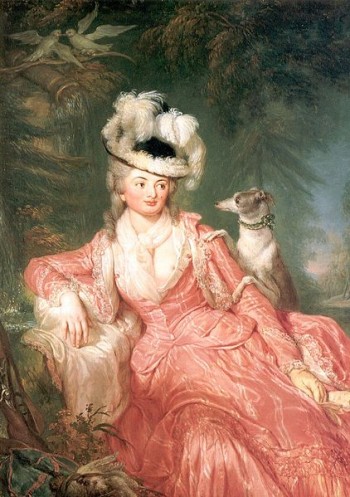
Wilhelmine was described as smart, ambitious, and
voluptuous. Too bad she wasn't running Prussia.
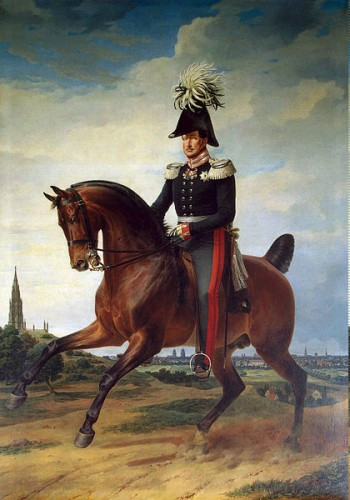
Frederick William III
|
|
Napoleon
|
As
1800 loomed, Germany was now the great prize. It was a
vast, rich territory that was so horribly divided that it
was practically begging to be invaded by someone.
Considering there was no central leadership to coordinate any
effective resistance, Germany was ripe for the picking. Napoleon walked
through Germany like it wasn't even there.
With
Napoleon sweeping through defenseless, divided Germany, he
knocked off one small territory after another like bowling
pins. Now Prussia decided to take a turn at trying to stop
the Sicilian menace.
So who would you rather have leading your army against
Napoleon, one of the greatest warriors of history?
Would you rather have an evil genius like Frederick the
Great or a pious, decent church man like Frederick William
III?
Docile and slow to recognize the growing French threat,
Frederick's decision to go to war ended in national
humiliation. On 14 October 1806, at the Battle of Jena-Auerstädt,
Napoleon rolled through Frederick's Prussian army like it
wasn't even there.
Thanks to the total collapse of the once-proud Prussian
army, the royal family fled to Memel, East Prussia, where
they fell on the mercy of Emperor Alexander I of
Russia to protect them.
Alexander, too, would soon suffer defeat at the hands of the French.
In 1807 at Tilsit, Poland, on the Niemen, France made peace
with Russia and Prussia.
Napoleon dealt with Prussia very harshly, despite the
pregnant Queen's personal interview with the French emperor.
Prussia lost many of its Polish territories, as well as all
territory west of the Elbe. Plus it had to finance a large
indemnity and pay for French troops to occupy key strong
points within the Kingdom.
Furthermore, Prussian troops were forced to fight for
Napoleon in his next campaign against Russia. Each
time he defeated a country, Napoleon ordered the country to
contribute men to his army. Then Napoleon would go against
the next country twice as strong.
By the time Napoleon reached Russia, he had completely
shattered the European balance of power that had kept the
various countries in check for centuries. His Grande Armée had grown to preposterous dimensions;
his force of
600,000 men consisted of troops not just from France, but
troops from Prussia, Italy, Germany, and Austria as well.
Russia's army was terribly outnumbered. It
was one single country - Russia - against men from five
countries with Napoleon leading them.
What betting man would have given Russia any chance at all?
Amazingly enough,
Napoleon had made the worst mistake of his life trying to
attack Russia.
Russian forces almost never engaged Napoleon in direct
battle. Instead, their armies retreated and retreated,
burning all food supplies in the process.
Countless Russian peasants died of starvation, but
Napoleon's men were now running low on supplies.
Napoleon understood the danger he was in, but he believed he
would find food in Moscow. So he kept on going deeper
into Russia. Finally he reached Moscow. That's
when the Russians decided to burn Moscow to the ground. Who
burns their own capital? Napoleon never saw that one coming. Checkmate.
Napoleon was forced to retreat in dead of the Russian
winter. Starvation and bitter cold killed countless
men. Cossacks raiding his flanks at every turn did the
rest. By the time Napoleon finally reached safety in Poland,
his numbers had dwindled to 100,000.
The events of Napoleon's 1812 march on Moscow is one of the
most fascinating stories in all military history. If you are
curious,
Road to Moscow.
|
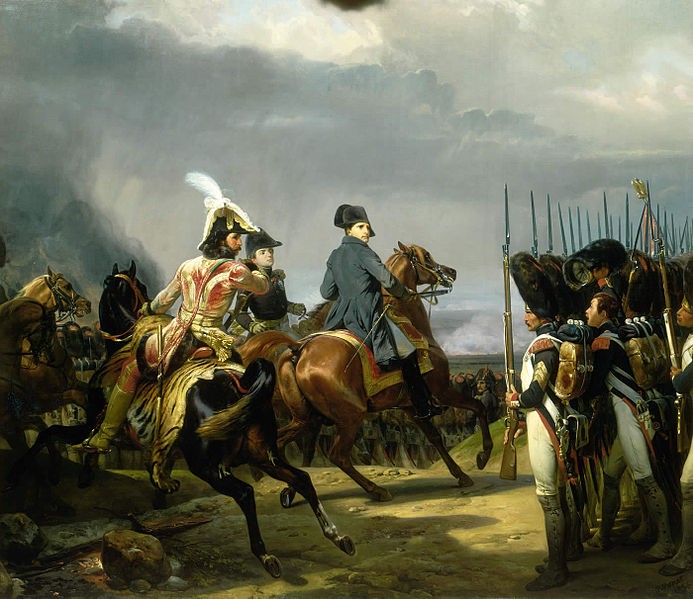
Napoleon at Jena-Austerlitz, 1806
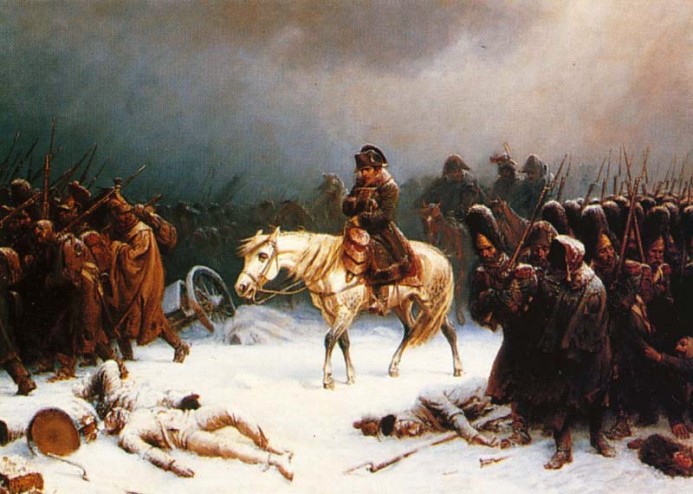
The
long road home to France after the Russians burned Moscow.
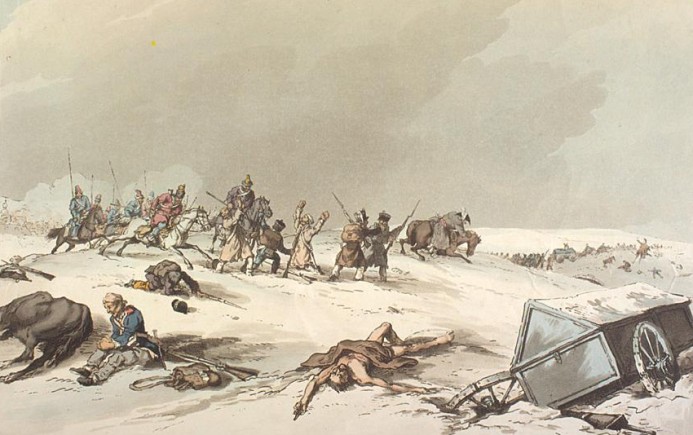
|
| |
|
1801
Treaty of Lunéville
|
Ironically, Napoleon, Prussia's greatest enemy,
inadvertently did more to advance German Unification than
any other person since Charlemagne.
During the French Revolution, a process had begun whereby
the hated nobility was attacked in every way possible.
Some lost their heads, some lost their lands, many lost
both. Almost all the lands owned by the French nobles were
confiscated and given to the State of France. In addition,
many of the lands owned by the Catholic Church were taken as
well.
However, not all the stolen property belonged to the French
nobles. As it turned out, many of the confiscated
lands belonged to German princes living east of the Rhine.
They demanded to be compensated. After all, they owned
the hereditary title to the land.
There was no way France or Napoleon was going to give these
properties back. Once Napoleon came to power, he
wanted it understood that these territories PERMANENTLY
belonged to France. But he acknowledged the German
princes had a rightful claim that might come back to haunt
France down the road.
After consolidating his own position in France, Napoleon
chose to expand France's domain. Shortly before 1800,
he began to attack the Habsburg Empire... or Austria... or
the Holy Roman Empire... whatever you want to call it.
Napoleon won battle after after battle. After
particularly stinging defeats in Italy (Marengo 1800)
and Bavaria (Hohenlinden 1800), Austria/HRE/Habsburg
was down on its knees and begging for peace.
With the Treaty of Lunéville in 1801, French Napoleon
made out like a bandit. He had the Holy Roman Empire sign
over all German territories left of the Rhine River.
Another clause in the Treaty of Lunéville
acknowledged these territories had once belonged to various
German princes, who now deserved to be compensated.
Holy Roman Emperor Francis II was obliged to say he agreed
France now owned all those lands west of the Rhine and that
the compensation process was legal.
So what did all this mean??
It meant that France agreed these men were owed
compensation, but the Holy Roman Empire was put in charge of
paying the debt. In other words, the Holy Roman Empire
was being forced to reward the German princes not France!
So where was this "compensation" land supposed to come from?
The
Catholic Church was about to be stripped bare through a
process known as Secularization whereby the secular
lands held by an ecclesiastical ruler such as a bishop or an
abbot to a secular ruler were redistributed.
To satisfy the terms of the Treaty of Lunéville, The Holy Roman
Emperor had little choice but to take possessions owned by the Church and
give them to the German princes instead.
Mediatization was another means of compensation. Here
the Emperor allowed many smaller German states to be annexed
by larger German states.
What utter chaos. Overnight an incredible amount of money,
stuff, citizens, and territory (most of which had belonged
to the church) began to change hands.
The outcome was the most extensive redistribution of
property in German history before 1945. The rationale had
been to compensate those rulers who had lost territory to
France, but through quirks in the system, considerably more
territory was gained through massive secularization.
For example, Baden received over 7 times as much
territory as it had lost, Prussia nearly 5 times.
Hanover gained the Prince-Bishopric of Osnabrück, even
though it had lost nothing. In other words, in trying
to keep favor with the German princes, his power base, the
Emperor gave up more church land than was probably
necessary.
With every winner there has to be a loser. The big
loser was the Catholic Church which saw its vast land
holdings in France and Germany vanish before its very eyes.
At this point, the position of the Roman Catholic Church in
Germany was nearly destroyed. A major consequence of
the redistribution and redrawn boundaries essentially was
the breakup of the Holy Roman Empire.
This situation amused Voltaire to sarcastically remark the
HRE was "neither holy, nor Roman, nor an empire".
Another consequence of the Peace of Lunéville was the
hugely weakened the Austrian position within Germany. In
order to make up for the loss of the west bank of the Rhine,
Francis II, the Holy Roman Emperor, was forced to
secularize ecclesiastical lands on the east bank.
This
move lost him support in the Imperial Diet still loyal to
the Church, handing the initiative in Germany to Prussia.
Prior to 1806, German-speaking Central Europe included more
than 300 political entities, most of them part of the Holy
Roman Empire or the extensive Habsburg hereditary dominions.
They ranged in size from small and complex territories of
the princely Hohenlohe family branches to sizable,
well-defined territories such as the Kingdom of Bavaria and
the Kingdom of Prussia.
Their governance varied: they included free imperial cities,
also of different sizes, ecclesiastical territories, also of
varying sizes and influence, and dynastic states such as
Württemberg.
These lands made up the territory of the Holy Roman Empire,
which at times in the past had included more than 1,000
entities. While it is true that total had dwindled
over time, as recently as the eve of the French Revolution, Germany's
status was still in deep disarray. It consisted
of well over 250 self-governing states and 50 or so
"free and imperial cities" that self-ruled.
Once the land grab began, the larger states gobbled up the
smaller entities within them like a giant Pac-Man and
absorbed them into one united territory.
When the smoke
had cleared, Germany had gone from
approximately 300 political units down to 39.
As this story has made clear, while kingdoms such as England, France, and Spain had become
more centralized under one hereditary monarch over the past
1,000 years, Germany, i.e. the Holy
Roman Empire, was a direct contradiction. Not once had this
part of Europe come close to coalescing into a
centralized entity.
This impasse had been caused by the tentacles of
interference spread
throughout Germany emanating from Rome. Now that the
presence of the Church had been obliterated, the coast was
finally cleared for progress.
And to think that it took a monster like Napoleon to start
the ball rolling. Wonders never cease.
|
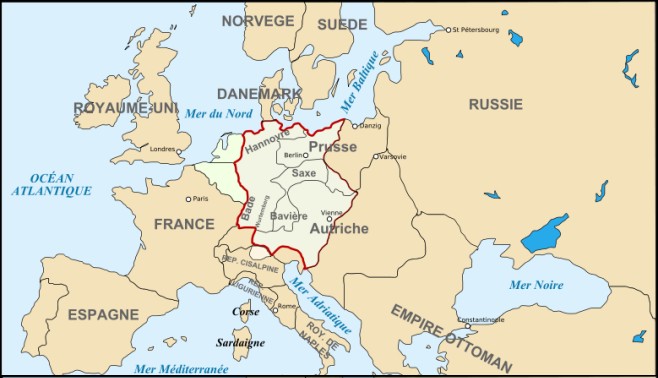
It is
now 1801. Here is the new map of the Holy Roman Empire based
on the terms of
Lunéville.
It was created at the rise of Napoleonic France. The
Rhine River formed most of the eastern border of French
territories.
Belgium, the Netherlands, and Luxembourg would gain
independence from France in 1815 after Waterloo, but the
borders on this map still exist today.
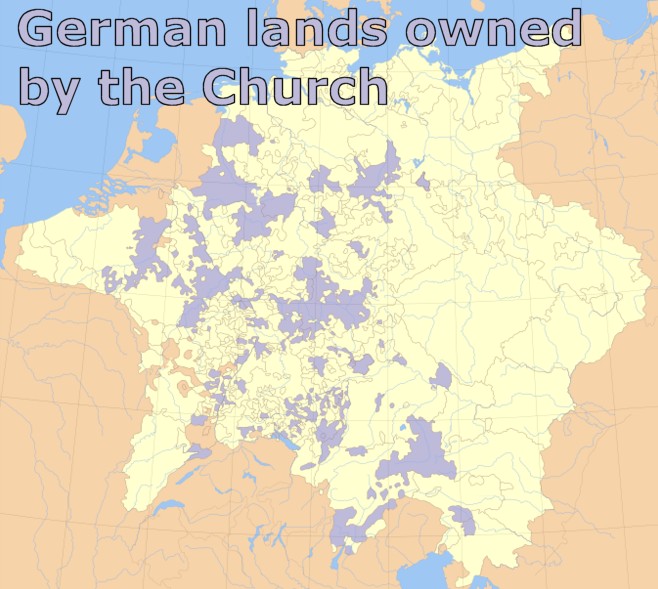
Ecclesiastical lands of the Holy Roman Empire on the eve of
secularization. Those purple lands would now become
the property of German Princes.
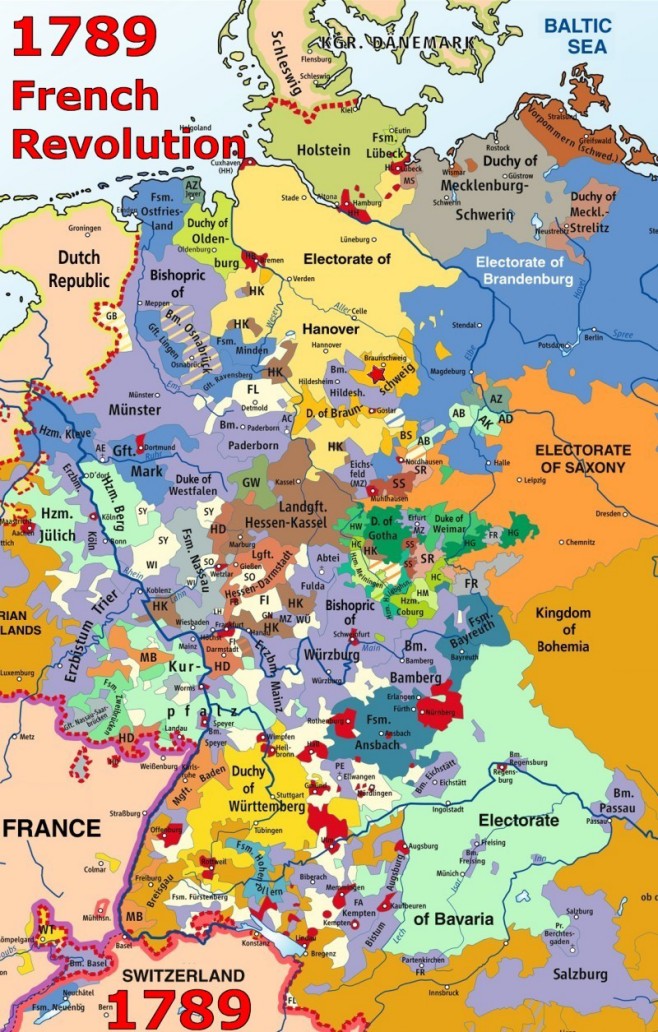
Another look at the mishmash of Germany. Up at the
top, look for Hanover in yellow. During the 1801 land
grab,
Hanover
absorbed
Osnabruck.
This was an example of how the German map was becoming more
simplified.

|
| |
|
Waterloo
|
King Frederick Wilhelm III made a complete fool of himself
during the Napoleonic Wars.
First, Prussia twiddled its fingers for 10 years (1795-1805)
while Napoleon gained momentum. Napoleon was quite
gifted at playing the European powers against each other.
Using promises and threats, he effectively persuaded and
intimidated Prussia into doing nothing until it was too
late.
In fact, the Russian Tsar had visited the Prussian king in
Potsdam. The two monarchs secretly swore to make common
cause against Napoleon.
Had Prussian forces been engaged
against the French in 1805, this might have contained
Napoleon and prevented the eventual Allied disaster at
Austerlitz.
In any event, Prussia vacillated in the face
of the swift French invasion of Austria and then hastily
professed neutrality once the Third Coalition was crushed.
It is sad to think Napoleon could have been stopped ten
years prior to his eventual defeat in 1815 at Waterloo had
Prussia joined in at the right time.
After Austerlitz, Frederick Wilhelm III compounded his
error by declaring war on France. Influenced by his
wife Queen Louise and the war party in Berlin, in August
1806 Prussian king Friedrich Wilhelm III made the
decision to go to war independent of any other great
power, save the distant Russia. To go it alone was
sheer insanity!
Napoleon could scarcely believe Prussia would be so foolish
to take him on in a straight fight with hardly any allies at
hand on its side, especially since most of his Grande Armée
was still in the heart of Germany close to the Prussian
border.
Napoleon crushed the Prussian army effortlessly in the 1806
Battle of Jena.
Prussia paid a heavy price for its foolish impertinence. The king
was obliged to pay a large indemnity, forced to cap his army
at 42,000 men, and forced to allow French troops to be
garrisoned throughout Prussia.
Napoleon had succeeded in turning Prussia into a French
satellite, a condition that lasted for six long years.
It was only through Napoleon's colossal blunder in 1812 that
Prussia got back into the war. Seeing Napoleon race
through Prussian territory back to France in a panic after
his Russian collapse, Prussia decided to chase him all the
way back to France.
From France, Napoleon regained his strength and prepared to
take on all comers. Up till now, all the nations were
terrified to take him on again. However, once his
mantle of invincibility was stripped away by the Russian
debacle, the major powers of Europe decided it was time to
put the man down.
The 1813 Battle of Leipzig was fought by the
coalition armies of Russia, Prussia,
Austria, and Sweden led by the Russian Czar
Alexander I against the French army of Napoleon I at
Leipzig, Saxony. Napoleon's army also contained Polish and
Italian troops as well as Germans from the Confederation of
the Rhine. The battle marked the culmination of the autumn
campaign of during the German campaign and involved
over 600,000 soldiers, making it the largest battle in
Europe prior to World War I.
Being decisively defeated for the first time in battle,
Napoleon was compelled to return to France while the Allies
hurried to keep their momentum, invading France early the
next year. Napoleon was forced to abdicate and was exiled to
Elba in May 1814.
However, Napoleon would escape from Elba and return to rearm
France. The Prussian troops would play a pivotal role in the defeat of
Napoleon at the Battle of Waterloo fought in Belgium
on June 18, 1815.
Following his daring escape from Elba, Napoleon faced tough odds.
Four major enemies had just declared war on him.
Having no choice but to fight, Napoleon began to study his
maps. He felt his best hope for victory was to strike
at the nearest Allied armies, those of England’s Arthur
Wellesley, better known as the Duke of
Wellington, and Marshall Blücher of Prussia.
As usual, France was outnumbered 70,000 to the combined
British-Prussian 120,000. Fortunately, these Allied armies were strung out across Belgium.
Napoleon correctly reasoned that he had time to sweep aside
the two armies one at a time before turning to face the slowly advancing armies
of Russia and Austria-Hungary. As long as
Napoleon could face one army at a time, he was tough to
beat.
Indeed, Napoleon seemed well on his way to making his plan a success.
On June 16, he sent his "A Team" up against Wellington and
his "B Team" up against Blücher.
Having endured French occupation for six years, this
particular Prussian army was a shadow of their previous
greatness under Frederick. Napoleon
knew full well that despite their impressive size, this force posed only a mild threat.
Indeed, Napoleon
sent his second string up against the Prussians at Ligny and
smiled as they handled the battle without difficultly.
Gebhard Leberecht von Blücher was the Prussian
general during his army's serious defeat at Ligny.
In the middle of the battle, the old field marshal (72) had
his horse shot out from under him.
He lay trapped under his dead horse for several hours and was
nearly trampled to death by his own cavalry rushing to
battle. His life was narrowly saved thanks to the
devotion of his aide-de-camp, Count Nostitz.
Blücher was unable to resume command for some hours.
After bathing his wounds in brandy, and fortified by liberal
internal application of the same, Blücher rejoined his army.
However, by the time he returned, the battle was long over.
Fortunately, August Neidhardt von Gneisenau, his talented
second-in-command, had rallied his troops enough to keep the
army from total defeat.
Napoleon was long gone. He had turned his complete attention to
Wellington and the British. In a way, the defeat of
the Prussians may have been too easy.
Napoleon's men
had badly mauled the Prussians, yet he didn’t follow up the
victory with his customary speed and determination.
|
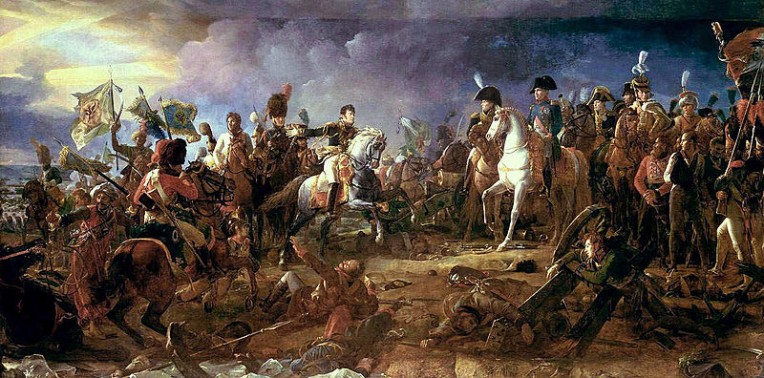
Napoleon defeats Austria and Russia at
Austerlitz, December 2, 1805
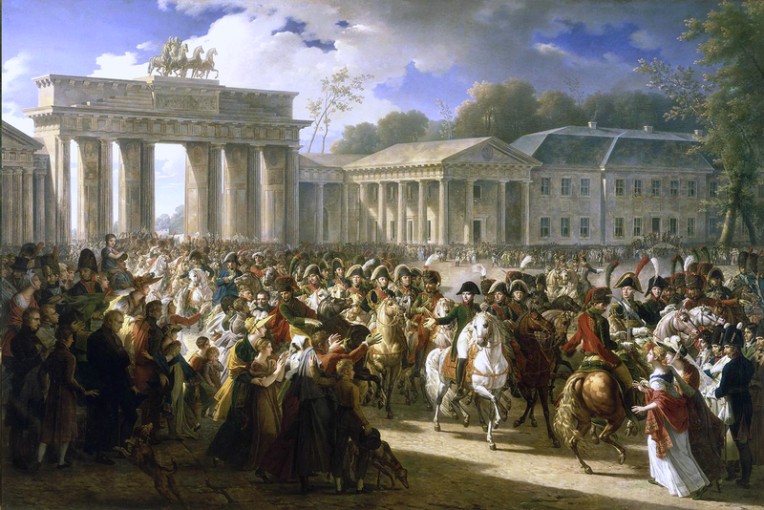
The French Army marches through Berlin in
1806 following its defeat of Prussia in the Battle of Jena.

The
Battle of Leipzig, October 1813, a source of major pride to
Prussia as their army played a major role in Napoleon's
defeat on German soil.
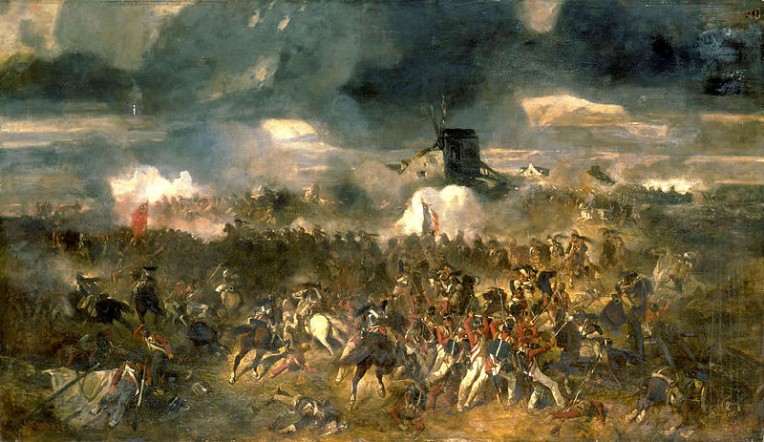
The
Showdown at Waterloo, June 18, 1815
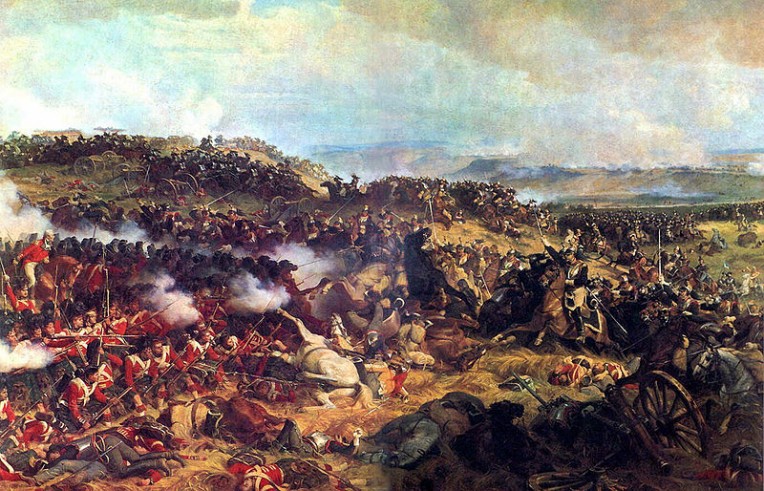
The
failed charge of the French cavalry against the British
Square
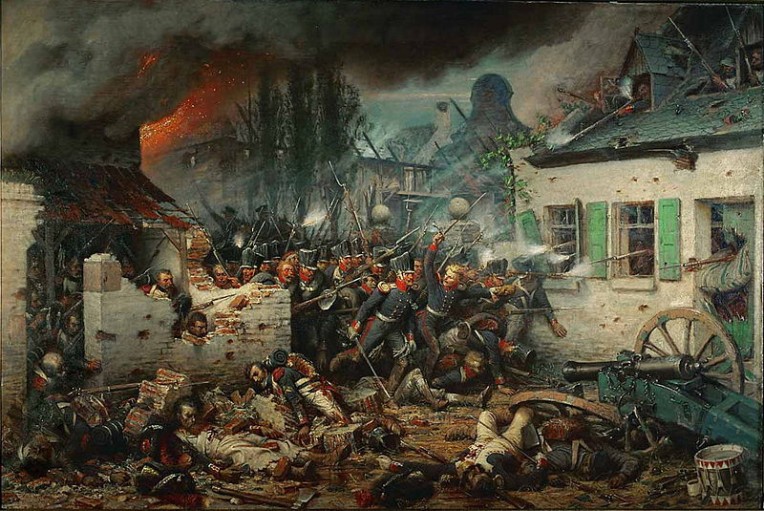
A
picture of the Prussian attack on Plancenoit, the
intervention that distracted Napoleon long enough to save
the day for Wellington's army.
|
Why not?
Napoleon was so worried about Wellington that he failed to
finish the Prussians off so he could begin pursuing the British
instead.
Napoleon assumed that the badly beaten Prussians would
simply slink back to Germany and lick their wounds. As
a result, he missed a golden opportunity to destroy the
Prussian army completely.
Napoleon
did leave a force behind to keep an eye on the
Prussians, but somehow the French lost track of the Prussian
movements.
|
For his part, Wellington was nearly beaten in a preliminary
skirmish at Quatre Bras and was forced
to retreat.
Having narrowly missed defeat at Quatre Blas,
Wellington knew there was a good chance his army was
overmatched. However, if Blücher could reinforce him, he was
willing to risk another battle with Napoleon.
The problem was that Blücher was so far away, Wellington had
no certainty that a messenger could get to him in time.
By sticking around to wait for Napoleon, Wellington
was making a huge gamble.
Meanwhile, in the Prussian camp, Gneisenau, the second in command,
feared that the British had reneged on their earlier
agreements. Noting the low morale of the troops,
Gneisenau vehemently favored a withdrawal. There was
no way these men had the confidence to go back into battle
so quickly. At the first sign of defeat, surely the
Prussian army could easily fold.
This, of course, was exactly the attitude Napoleon had hoped
for. However, Blücher wasn't going to give up that
easily. Once he received Wellington's message
imploring him to stay and fight, Blücher sent back word that
he was sending two Corps to join
Wellington at Waterloo.
The actual battle itself carried an enormous element of
suspense regarding Blücher.
In the case of Waterloo, it is highly likely that Wellington
would not have accepted battle had he not believed Blücher
was on the way. Whenever asked, Wellington would
always say he knew the Prussians would show. However,
Wellington was clearly worried about the Prussians.
Something told him that it was dangerous to depend on their
army.
To hedge his bet, Wellington deliberately posted 17,000 men
well to the west to cover a retreat to the coast if
necessary.
Many have criticized Wellington for wasting these troops,
but had Blücher not arrived and Wellington had been forced
to retire, these 17,000 men were there to save his army from
complete destruction. Analysts note this move shows that
Wellington had misgivings that Blücher wouldn’t show.
Sure enough, the battle started and there was no Blücher.
Wellington expected the man to arrive much earlier in the
day. He was clearly worried because onlookers noted he was
constantly looking to his left flank, trying to see any sign
of the Prussians appearing from the trees.
Meanwhile the Prussian Chief of Staff, Gneisenau, didn’t
trust the English and the way he ordered the Prussians to
advance meant they would do so at a leisurely pace.
Historians have suggested this pace was deliberate for a
reason. This way, if the English were on the verge of
defeat, the Prussians wouldn’t be fully committed and could
retreat in safety. However, if the English did stay
and fight, the Prussians would, sooner or later, arrive.
As the day continued, Wellington was growing more and more
concerned. The battle hung in the balance.
Neither side had a decided advantage. Wellington was
certain that if the damn Prussians would just show up, he
could turn the battle in England's favor.
Late in the day, Wellington was heard to mutter his famous
words, "Give me night or give me Blücher".
In other words, Wellington had waited so long for the
Prussians, he could no longer disengage safely. But
his men were tiring and seemingly on the verge of breaking.
He had to stay and hope the Prussians arrived. If he ran
now, his army would cut to pieces during their retreat and
be utterly destroyed.
If the Prussians failed to show, then nightfall was their
last hope to avoid defeat.
Suddenly, the Prussians did appear and they immediately went
to work. It was about 6 pm and the Prussians were growing
stronger on his right flank.
Napoleon ordered Marshall Ney to capture La Haye Saint at
any cost. Ney put together a proper attack with
infantry, artillery and cavalry, and he finally drove the
British out of La Haye Saint because the British defenders
ran out of ammunition.
Ney then moved up a battery of artillery. Now Wellington’s
centre came under direct cannon fire. The crisis of the
Battle of Waterloo had been reached. The next few minutes
would determine a winner and loser.
Wellington’s nerve was stretched to its limit and he called
for all his troops to make a last stand in the center. He
prayed the Prussians would hurry.
As for Ney, he knew the English could be beaten right
now if he had more men. He appealed to Napoleon to
give him the Old Guard. Now was the time for the Guard to
bring victory.
Amazingly, Napoleon blinked. Had he followed Ney's advice,
the French indeed had a critical opportunity. Having,
Napoleon appeared so preoccupied with the Prussians that he
couldn’t recognize this moment as being the crucial moment
in the battle.
Instead Napoleon decided to take care of the Prussians and
solidify his right flank. Half an hour later, his
right flank was stable. Now Napoleon finally turned
his attention to Wellington’s center and finally ordered the
Guard to make its assault.
But it was a half hour too late. No one can give a general
of Wellington’s quality that kind of time to recover. The
British center was now strong enough to hold and defeat the
Guard.
Historians give Arthur Wellesley, the Duke of Wellington,
enormous credit for standing toe to toe with one of the
greatest military strategists of all time. However,
Wellesley was no slouch himself. He won every campaign
he ever participated in and never lost a major battle.
His overall battle record was 32 victories, 6 defeats, and 8
indecisive results. Wellesley would go on to twice
become Great Britain's Prime Minister.
However, no matter how great Wellington's performance was at
Waterloo, Blücher’s arrival was clearly the turning point.
His appearance demonstrated the great honor of this aging
Prussian warrior. Blücher may have lacked tactical
genius, but he had a charisma to lead his troops to great
feats of courage.
With the battle hanging in the balance Blücher's army
had intervened with decisive and crushing effect. His vanguard
drew off Napoleon's badly needed reserves at the most
critical moment in the entire day.
The Prussian intervention had saved the day. Europe was
finally safe from the Sicilian monster. From the
German perspective, the actions of Blücher's troops at
Waterloo became a rallying point of pride and enthusiasm.
|
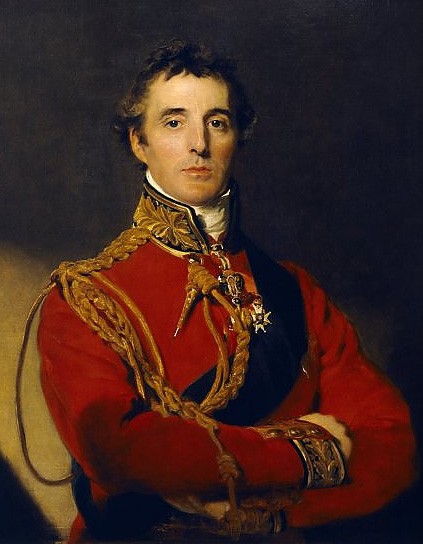
Arthur
Wellesley, the Duke of Wellington
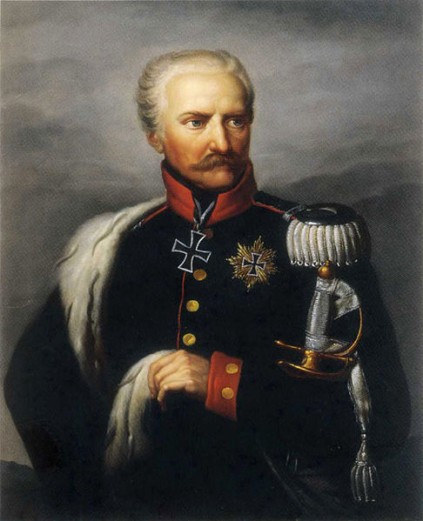
Gebhard Leberecht von Blücher, the great Prussian hero
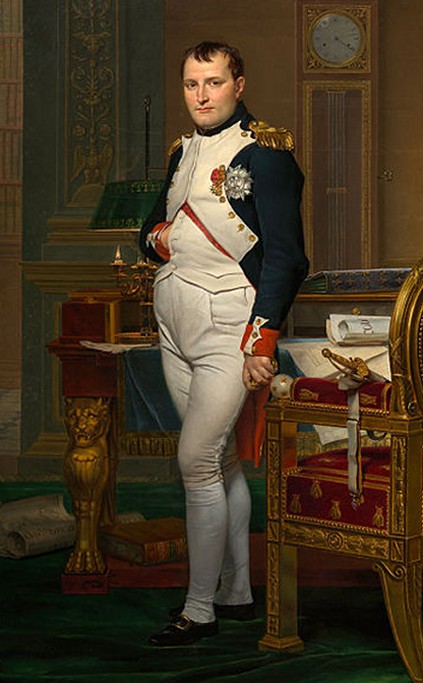
Napoleon Bonaparte.
Love
him or hate him, there is no doubt he was a genius.
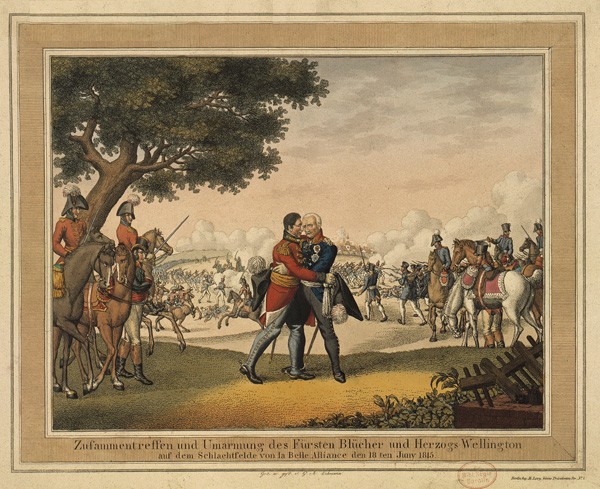
A
picture of Wellington and Blücher embracing after the
battle.
No doubt that Wellington is whispering, "What took you so
long?"
|
|
| |
|
1815
Congress of Vienna
|
Improbable and absurd as it may seem, Prussia emerged from
the Napoleonic Wars as the dominant
power in Germany.
Prussia had done
practically nothing to stop Napoleon. Their main
strategy was to avoid confronting him at all costs.
Then by losing to him quickly at Jena, Prussia was
able to avoid being devastated by allowing the French to
occupy their country for 6 years.
Prussia's King Frederick Wilhelm III was considered one of
the least talented rulers in Europe. The whispers
suggested his wife Queen Luise had been the real power in
Prussia until her death.
As for the army, the Prussian army had accomplished very
little until Waterloo. Indeed, even their brilliant
intervention at Waterloo could be attributed more to
accidentally showing up at the perfect time than any
brilliant strategy on their part.
It was difficult to overlook that their army had been
thoroughly beaten by Napoleon's B Team only two days
previous.
So much for mighty Prussia.
And yet Prussia kept growing. First Prussia had gained
valuable territory around the Rhine River via "mediatization
and secularization" during the dissolution of the Holy Roman
Empire in 1801-1806.
Thanks to the first victory over Napoleon in 1814, Prussia
had been granted 40% of the highly coveted Saxony.
Now thanks to their part at Waterloo in the final victory over Napoleon, Prussia's reward in 1815 at
the Congress of Vienna was the recovery of her lost
territories, as well as the whole of the Rhineland and
Westphalia.
These western lands
were to be of vital importance because they included the
Ruhr Valley, center of Germany's fledgling industrial
industry.
These territorial gains also meant the doubling of Prussia's
population.
The German-speaking world took notice. Prussia was now
beginning to overshadow long-time rival Austria,
which had abdicated the imperial HRE crown in 1806.
The impression was that Prussia was on the rise, Austria on
the decline. However, a simple look at the map shows
that Austria-Hungary was still twice as large as Prussia.
In 1815 Prussia became part of the
German
Confederation. The German Confederation was a loose
association of 39 German states in Central Europe, created
by the Congress of Vienna in 1815 to coordinate the
economies of separate German-speaking countries and to
replace the former Holy Roman Empire.
|
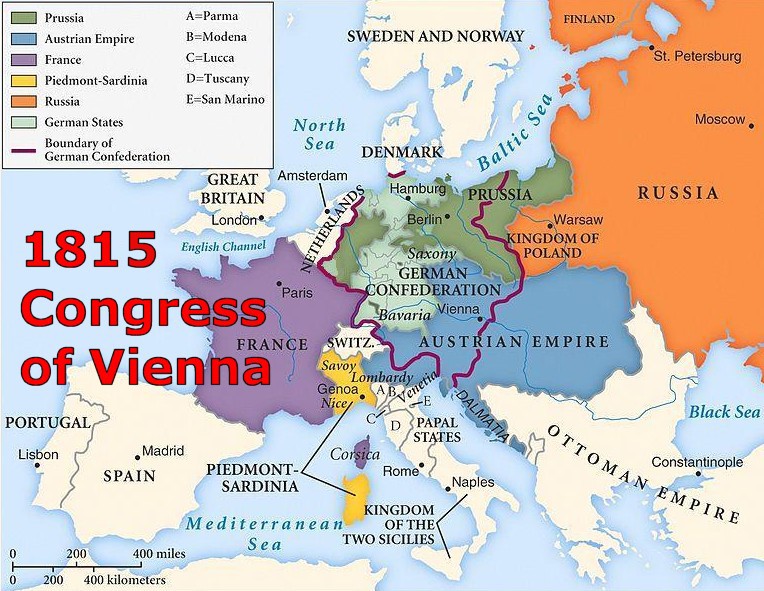
As one
can see, Prussia now has considerable land holdings along
the Rhine.
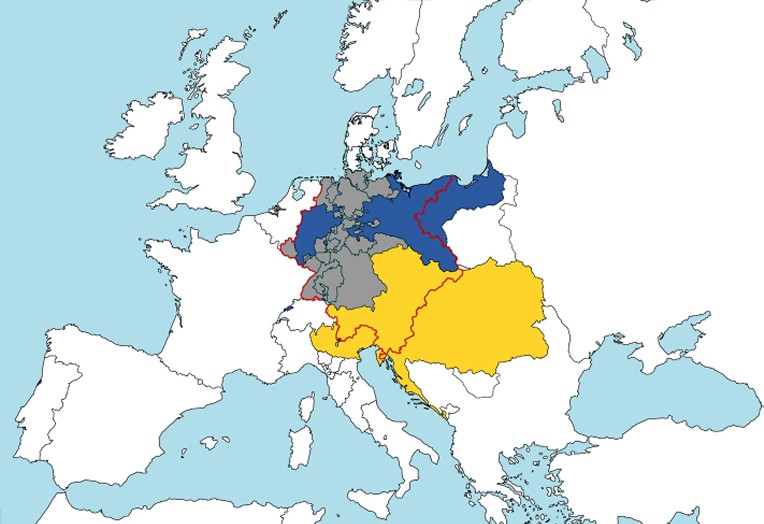
Boundaries of the German Confederation. Prussia is blue,
Austria yellow, the rest grey.
With
Napoleon and the Church out of their hair, the rivalry
between Prussia and Austria, a struggle known as
German
dualism,
began to heat up in earnest for control of the German world.
The Confederation was created to act as a buffer between the
powerful states of Austria and Prussia, but it would fail
completely.
|
|